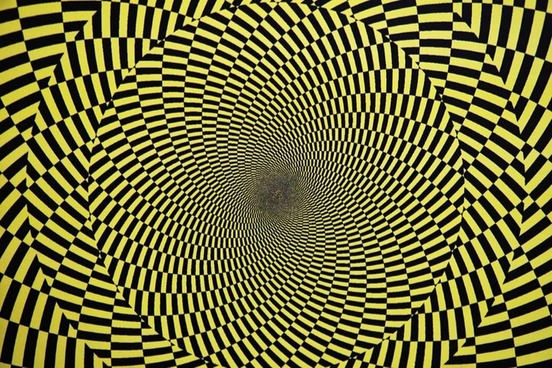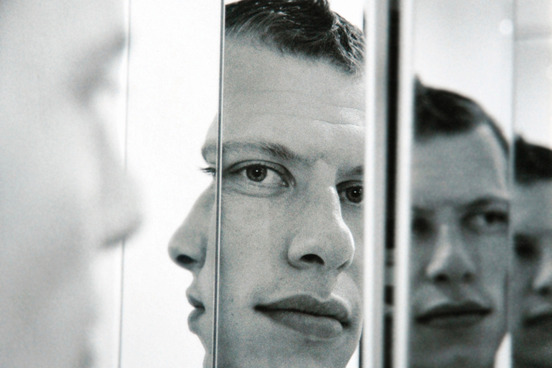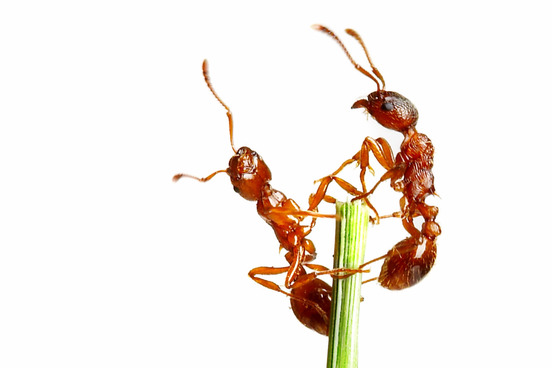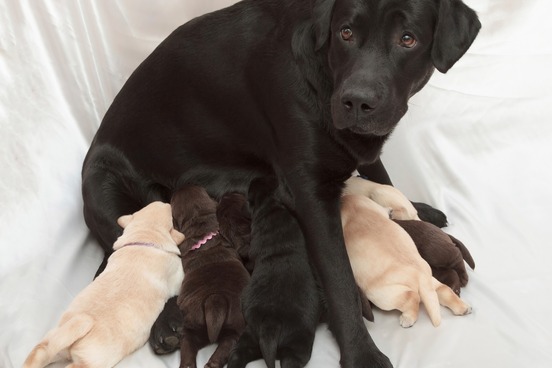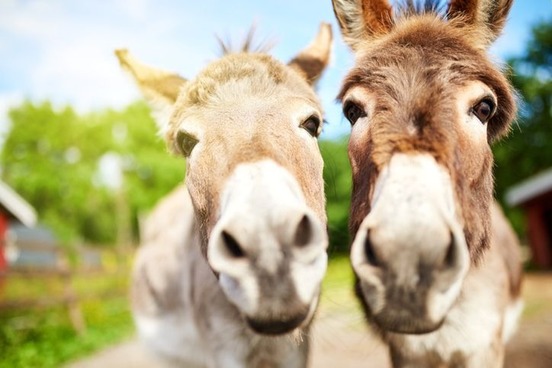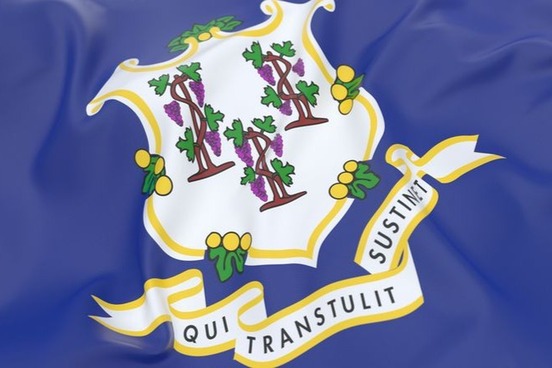For the long time, lexicographers have been debating about the legitimacy of certain words as possible entrants to the English dictionary. For me, the longer the word and the more the number of syllables in it, the more interesting it becomes. Find out some of the most exquisitely coined words in the English language from this article.
Longest word
Methionylthreonylthreonylglutaminylarginyl […] isoleucine
Here’s the deal: the world’s longest English word has exactly 189,819 letters in it and it takes 3 hours and 33 minutes to pronounce it completely!
Wondering what commands such an enormous (literally) honor? Well, it is the chemical name of the world’s largest known protein called titin or connectin. It is made up of 244 individually folded protein domains which in turn are connected by unstructured peptide sequences (largest known polypeptide containing 34,350 amino acids in the human body). Fascinating as the name of this wonder is, there exists some debate as to whether this technical term can actually be considered a word. But even then, mesmerizing it is, isn’t it? And guess what? Here in this article, you will actually get to see this ginormous word if you read on.
But even otherwise, the English language is a huge storehouse of long words that I find rather satisfying to pronounce. They are grand tongue twisters that make perfect sense. Two of my favorite words for the longest time have been inconsequential and quintessentially. I am psychologically satiated to the hilt every time I utter them and utter them a lot I do. But there are other words that are very rarely used and even more rarely heard of. Let’s check some of them out below. If you love the language and lap up trivia like there’s no tomorrow, this is a train ride you should definitely not miss.
A

1. Ablutophobia: Fear of washing or having a bath
2. Absorbefacient: Inducing or boosting absorption
3. Adiathermancy: Impervious to radiant heat or infrared radiation or unaffected by heat waves
4. Agglutination: The construction of words from component morphemes that retain their form and meaning in spite of the blending
5. Arachibutyrophobia: One having fear about peanut butter sticking to the mouth roof
6. Aurantiaceous: Appertaining to oranges or orange trees
7. Automatonophobia: One having fear about dummies, animatronic creatures, statues of wax
8. Autothaumaturgist: A person who exudes an air of mystery around himself consciously; someone pretending to be an enigma
9. Autotonsorialist: A person who cuts his own hair
10. Automysophobia: Fear of getting dirty
B

1. Ballistocardiograph: An instrument which is used to detect body movements caused by heartbeats
2. Bathythermograph: An instrument that is used for recording water temperature as compared to depth
3. Batrachomyomachy: A military engagement between frogs and mice
4. Batrachophagous: A person who eats frogs
5. Bicrescentic: Having the structure of a double crescent
6. Blandiloquence: A flattery or complimentary speech
7. Brachydactylous: Having abnormally short and blunt fingers and toes
8. Brobdingnagian: Colossal
9. Bouleversement: An overturning; ruination
10. Boustrophedon: An ancient method of writing in which one line is written from left to right and the next from right to left and so on.
C

1. Cacodemomania: Pathological belief of one being inhabited by an evil spirit
2. Caesaropapism: Secular ruler having control of the church
3. Catapedamania: Obsession with jumping from high places
4. Cephalonomancy: A kind of divination formerly practiced to detect guilt in a convict by boiling the skull of an ass and checking for any cracking of the skull or movement of the lower jaw
5. Ceruminiferous: Carrying or yielding earwax
6. Chaetophorous: Setigerous or bristle-bearing
7. Cheiloproclitic: One who is attracted to lips
8. Cholangiocholecystocholedochectomy: Process of surgically removing the hepatic duct and gallbladder
9. Chronosynchronicity: Presenting a person’s life in all the stages through a single piece of art
10. Cycloganoidei: Ganoid fish with cycloid scales
D

1. Dactylopterous: A state where the inferior rays of the pectoral fins are entirely or partially detached from the body
2. Defecaloesiophobia: Fear of painful defecation
3. Dendrochronology: Study of tree rings
4. Deorsumversion: Turning downwards
5. Dermatoglyphics: Study of fingerprints and skin patterns
6. Dermatopathophobia: Fear of dermal ailments
7. Didaskaleinophobia: Fear of going to school
8. Dishabiliophobia: Fear of undressing in front of another person
9. Dolichocephalic: Long-headed
10. Dysmorphophobia: Having the fear of physical deformities
E

1. Ecclesiasticus: An Apocryphal book
2. Edriophthalmous: Concerning the Edriophthalma
3. Electroencephalograph: An instrument for measuring the brain’s electrical impulses
4. Electrodynamometer: An instrument for measuring electric current
5. Eleutherophobia: Fear of freedom
6. Epiphenomenalism: Doctrine that mental processes are epiphenomena of brain activity
7. Ephemeromorph: Form of life that is neither animal nor plant
8. Epistaxiophobia: Fear of epistaxises or bleeding noses
9. Ethnomethodology: The study of sociological codes and conventions that underlie everyday social communication and interactions
10. Extemporaneousness: Lack of foresight
F

1. Febrifacient: That which renders feverish
2. Ferriprussiate: A ferricyanate; a ferricyanide
3. Flagelliferous: Bearing a whip or flagellum
4. Flibbertigibbet: Gossipy person, usually referring to a young woman
5. Fibriophobia: Having fear of fever
6. Fibrochondrosteal: Partly fibrous, partly cartilaginous, and partly bony or osseous
7. Fissigemmation: A process of reproduction that intercedes fission and gemmation
8. Forisfamiliation: The act of liberating oneself from parental authority
9. Frankalmoigne: Tenure by free alms
10. Frumentaceous: Resembling wheat or other grain
G

1. Galactodensimeter: Instrument used to measure the density of milk
2. Gastroduodenitis: Swelling of the stomach and duodenum
3. Gastrohysterotomy: Cæsarean section
4. Generalissimo: The Chief Commander of an army
5. Gephydrophobia: Fear of crossing bridges
6. Germanophilia: Love or fondness for Germany or for the Germans
7. Gluconeogenesis: Production of glucose from non-carbohydrates
8. Graminivorous: Feeding on grass or cereals
9. Grammaticaster: A piddling grammarian
10. Gynotikolobomassophile: One nibbling a woman’s earlobes
H

1. Haematogenesis: Production of blood
2. Haematodynamometer: An instrument to measure arterial or venous blood pressure
3. Haussmannize: To rebuild
4. Hellenologophobia: Fear of Greek terms or complex scientific nomenclature
5. Helioseismology: Study of wave oscillations in the sun
6. Hexakosioihexekontahexaphobia: Fear of the number six hundred sixty-six
7. Honorificabilitudinitatibus: One bearing honorableness
8. Honorificabilitudinity: Honorableness
9. Hydrometeorology: Study of atmospheric moisture
10. Hypercatalectic: Having an extra syllable at the end of a verse
I

1. Iatromathematics: Archaic practice of medicine in conjunction with astrology
2. Ichthyophagous: Fish-eating
3. Ichthyophthalmite: A hydrous silicate of calcium and potassium relating to zeolites
4. Immarcescible: Not perishable
5. Immunopathology: Study of immunity to disease
6. Incircumscriptible: Incapable of being restricted
7. Incomprehensibleness: Impossible to know or fathom
8. Interramification: Intertwining of branches
9. Interstratification: Alternative layering of two or more types of clay minerals
10. Ithyphallophobia: Fear of aroused male genitalia
J

1. Jaculiferous: Bearing arrow-like thorns
2. Japanophilia: Love or admiration for Japan or the Japanese
3. Japanophobia: Fear of Japanese
4. Johannisberger: A fine white wine produced on the estate of Schloss Johannisberg, on the river Rhine
5. Jouissance: Merriment
6. Judeophobia: Fear of Jewish people
7. Juglandaceous: Liking or pertaining to walnuts
8. Jungermanniaceae: A genus of hepatic mosses
9. Jurisprudential: Pertaining to the science of juridical law
10. Juxtaposition: The act of positioning two or more things adjacent to each other
K

1. Kakorrhaphiophobia: Fear of failure
2. Katagelophobia: Fear of ridicule
3. Katathermometer: Instrument used to measure the cooling power of air
4. Katsaridaphobia: Fear of cockroaches
5. Kephalonomancy: Divination using a baked head of an ass or a goat
6. Keraunophobia (or Ceraunophobia): Fear of lightning and thunder
7. Kinetheodolite: Type of theodolite used to track missiles and satellites
8. Knickerbockers: Loose breeches ending above the knee
9. Knickknackatory: A collection of baubles and trifles
10. Kosmikophobia: Fear of cosmic phenomenon
L

1. Lamellibranchiata: Class of gastropods with bivalve shells
2. Laryngotracheotomy: Surgery involving cutting into the larynx and the upper part of the trachea
3. Latitudinarianism: Doctrine of broad liberality in religious belief or conduct
4. Lautenclavicymbel: Lute harpsichord with gut strings instead of metal
5. Lautverschiebung: The regular alterations undergone by the primitive Indo-European stops or mute consonants in the Teutonic languages since third century BC
6. Lepidopterology: Study about butterflies and moths
7. Leucocytogenesis: Formation of leukocytes
8. Lexicographical: Pertaining to the art of making a dictionary or lexicon
9. Libanophorous: Producing incense
10. Logizomechanophobia: Fear of computers
M

1. Machiavellianism: The doctrines of Niccolò Machiavelli as written in his book Il Principe (“The Prince”) wherein political expediency is exalted above morality and the use of cunning and deceit in statecraft to maintain authority or to effectuate policy is commended
2. Macrocephalous: Having a large head
3. Margaritomancy: Divination using pearls
4. Maschalephidrosis: Excessive sweating of the armpits
5. Mechanotherapist: A practitioner who medically treats by employing mechanical practices, such as massaging
6. Medomalacuphobia: Fear of losing an erection
7. Metathesiophobia: Fear of changes
8. Microminiaturization: Construction of something on a scale which is smaller than miniature
9. Micropalaeontology: Study of microscopic fossils
10. Monopathophobia: Fear of definite disease
N

1. Necessitarianism: Philosophical theory according to which actions are always consequent to antecedent causes
2. Nemathelminthes: Roundworms
3. Neopharmaphobia: Fear of new drugs
4. Nephelodometer: An instrument for estimating the distances or speed of clouds
5. Neurophysiological: Pertaining to the branch of physiology that deals with the functions of the nervous system
6. Nigroglobulate: The act of excluding someone by a negative vote or veto
7. Noctambulation: Sleepwalking
8. Nucamentaceous: Resembling a nut either structurally or their property of indehiscence; bearing one-seeded nut-like fruits
9. Nucleomituphobia: Fear of nuclear weapons
10. Nyctohylophobia: Fear of dark wooded areas at night
O

1. Obeliscolychny: Lighthouse
2. Obsequiousness: Abject submissiveness
3. Omphalopsychite: One who meditates by stares fixedly at his navel
4. Oneirogmophobia: Fear of wet dreams
5. Ophthalmophobia: Fear of being stared at
6. Ophthalmoscope: Instrument for viewing the interior of the eye
7. Opisthobranchiata: Marine gastropod mollusks with no operculum and gills present posterior to the heart
8. Orphanotrophism: Care and support of orphans
9. Ostraconophobia: Fear of shellfish
10. Otorhinolaryngology: It is a study of ear, nose, and throat
P

1. Palaeoanthropology: The study of early humans
2. Paleophytologist: One versed in the recovery and identification of plant fossils from geological contexts
3. Paraskavedekatriaphobia: Fear of Friday the 13th
4. Penecontemporaneous: Of geological processes occurring immediately after deposition
5. Philoprogenitiveness: The love of offspring
6. Pleuroperipneumony: Inflammation of the pleura and lungs
7. Pneumatophilosophy: Philosophy of spirits or the spirit world
8. Podobromhidrosis: Smelly feet
9. Pseudoantidisestablishmentarianism: Falsely supporting the idea of disestablishment
10. Pteromerhanophobia: Fear of flying
Q

1. Quadragesimarian: One who observes Lent
2. Quadrigeminous: Four-fold
3. Quadrigenarious: Four hundred
4. Quasquicentennial: One hundred twenty-fifth anniversary
5. Quatrefeuille: An ornamental foliation having four foils
6. Quindecemvirate: The body or office of the fifteen sacerdotal college men bestowed with the primary duty of protecting the Sibylline books
7. Quinquagenarian: Person between the ages of 50 and 59
8. Quinquedentated: Five-toothed
9. Quoddamodotative: Existing in a certain manner
10. Quomodocunquize: Making money in any possible way
R

1. Radappertization: Treatment of food with ionizing radiation to kill bacteria
2. Radiometeorograph: An instrument for measuring atmospheric conditions at high altitude
3. Rambunctiousness: The state of being boisterous and disorderly
4. Ranidaphobia: Fear of frogs
5. Representationalism: Doctrine that ideas rather than external objects are basis of knowledge
6. Retrovaccination: The inoculation of a cow with human vaccination in which smallpox virus from human vesicles is used as seed virus in producing smallpox vaccine in cattle
7. Rhabdophobia: Fear of being severely punished or beaten by a rod, or of being severely criticized
8. Rhinotillexomania: Compulsive nose picking
9. Rodomontadist: A person who boasts
10. Roentgenometrics: A chiropractic technique involving the study of X-rays by biomechanical analysis and measurement
S
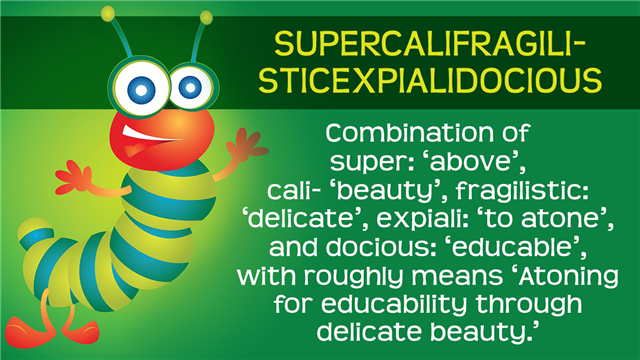
1. Sacramentarianism: Belief that sacraments have unusual properties
2. Scrophulariaceous: Pertaining to the figwort family of plants (Scrophulariaceae)
3. Secundogeniture: The right of inheritance belonging to the second-oldest child
4. Sesquicentennially: Every 150 years
5. Siderodromophobia: Fear of trains, railroads or train travel
6. Spasmenagaliaphobia: Fear of shattered glass
7. Spermatophobia: The fear of germs
8. Spectroheliokinematograph: Camera for taking pictures of the sun
9. Sphygmomanometer: An instrument for measuring arterial blood pressure
10. Steganophthalmata: A division of jellyfishes, including most of the large disklike species
T

1. Trinitrophenylmethylnitramine: A type of explosive
2. Tetrakishexahedron: A solid in the isometric system, bounded by 24 congruent isosceles-triangular faces, four corresponding to each face of the cube
3. Thanatognomonic: Indicating death
4. Theologicophobia: Fear of theology
5. Theophilanthropism: Having love for divinity as well as mankind
6. Thermoluminescence: A form of luminescence that is exhibited by certain crystalline materials that may have absorbed energy previously
7. Transmogrification: Transformation to a different form or shape, especially strange or grotesque
8. Trichopathophobia: Fear of hair
9. Triskaidekaphobia: Phobia of the number 13
10. Triboluminescence: Frictional emission of light
U

1. Ubiquitarianism: Belief in the omnipresence of God
2. Ultramicroscope: Instrument for viewing objects that are difficult to see by the naked eye
3. Ultimogeniture: The right of inheritance belonging to the last son
4. Umbraculiform: Umbrella-shaped
5. Uncircumstandtial: Not circumstantial; trivial
6. Uncompartmentalized: Not separated into different categories or compartments
7. Unconsentaneous: Disagreement
8. Uniformitarianism: The theory or assumption that the same natural laws and processes that operate in the universe now, have operated since its inception and apply everywhere in the universe and that all geological phenomena may be explained as the result of these existing forces
9. Unsoutcheoned: Destitute of an escutcheon
10. Utilitarianism: Adopting a code of conduct that determines ethical values
V

1. Valetudinarianism: The condition or state of mind of a sickly or weak person who is incessantly worried about personal health
2. Vasoconstriction: Narrowing of the blood vessels owing to the contraction of their muscular walls
3. Venturesomeness: Daring and adventurous
4. Venustraphobia: Being scared of beautiful women
5. Verminophobia: Being afraid of germs
6. Vernacularization: The act, process, or state of picking elements from a foreign language and modifying and accepting it as a part of a native dialect of a specific population
7. Virginitiphobia: Fear of rape
8. Vitricophobic: One who fears his step-father
9. Volumenometer: Instrument that determines volume of a solid
10. Voicespondence: Correspondence by means of formerly recorded conversations
W

1. Walloonphobia: Fear of Walloons (French-speaking Belgian community)
2. Wawaskeesh: An American elk
3. welterweight: A combat sports weight class division
4. Weatherometer: Instrument for measuring weather-resisting properties of paint
5. Weatherstripping: Material to seal the openings such as doors, trunks, windows to exclude the cold, wind, and rain
6. Weltanschauungen: One’s individual or a group’s outlook towards life
7. Whereinsoever: In whatever matter, respect, place, or action
8. Whippersnappers: People considered insignificant and pretentious
9. Whippoorwill: Night-jar from America
10. Whithersoever: Wherever
X

1. Xanthocyanopsy: Kind of color-blindness in which one can see only blue and yellow colors
2. Xanthomelanous: Pertaining to races with black hair and yellow or olive complexion
3. Xanthophobia: Fearful towards yellow color
4. Xanthospermous: Containing yellow seeds
5. Xenodocheionology: Liking for hotels and inns
6. Xenoglossophobia: Fear of foreign languages
7. Xerophthalmia: Dry eye syndrome
8. Xeroradiography: Kind of X-ray wherein the picture is taken on a paper and not on a film
9. Xiphophyllous: Sword-shaped leaved
10. Xylopyrographist: A poker painter
Y

1. Yachtsmanship: Adeptness in sailing a yacht
2. Yarborough: Hand of cards where no card is above nine
3. Yarnwindle: Tool used for winding the yarn
4. Yellowhammer: A passerine bird in the bunting family Emberizidae
5. Yellowshanks: American shorebirds of the sandpiper family
6. Yellowthroats: A New World warblers in the genus Geothlypis
7. Yeomanette: Old term for a woman serving in the American naval reserve during World War II
8. Yezdegerdian: Pertaining to Yezdegerd, the last Sassanian monarch of Persia, overthrown by the Muslims
9. Yogibogeybox: Things used by a spiritualist
10. Yttriferous: One that contains yttrium
Z

1. Zemmiphobia: Being afraid of the great mole rat
2. Zalambdodont: Having molar teeth with V-shaped ridges
3. Zarathustrianism: Zoroastrianism
4. Zeusophobia: Being scared of divine beings
5. Zigzaggery: Contortion
6. Zoanthodeme: Collective zooids of compound anthozoa
7. Zooarchaeology: Studying the remnants of animals on archaeological sites
8. Zoosporangium: A spore
9. Zeugmatography: A term previously proposed for magnetic resonance imaging (MRI)
10. Zeugobranchiata: A division of marine mollusks with gills on both sides of the body and paired renal organs
Now, here are some other fun words that are bound to wriggle those gray cells optimally. Most of them aren’t a part of any lexicon yet, but that doesn’t make them any less mesmerizing.
Here are the top 5 names of places on the globe with the longest names.
Taumatawhakatangihangakoauauotamateaturipukakapikimaungahoronukupokaiwhenuakitanatahu (85 letters) – A hill in New Zealand, the name of which stands for: “The summit of the hill, where Tamatea, who is known as the land eater, slid down, climbed up and swallowed mountains, played on his nose flute to his loved one”.
Gorsafawddachaidraigodanheddogleddolonpenrhynareurdraethceredigion (66 letters) – A town in Wales, the name of which means: “The Mawddach station and its dragon teeth at the Northern Penrhyn Road on the golden beach of Cardigan bay”.
Llanfairpwllgwyngyllgogerychwyrndrobwllllantysiliogogogoch (58 letters) – A northern Welsh town the name of which means: “The church of St. Mary in the hollow of white hazel trees near the rapid whirlpool by St. Tysilio’s of the red cave”.
Chargoggagoggmanchauggagoggchaubunagungamaugg (41 letters) – A lake in Massachusetts.
Nunathloogagamiutbingoi (23 letters) – The name of certain Alaskan dunes.
And here are two mind-boggling scientific terms for your pleasure.
Methionylglutaminylarginyltyrosylglutamylserylleucylphenylalanylalanylglutaminylleucyllysylglutamylarginyllysylglutamylglycylalanylphenylalanylvalylprolylphenylalanylvalylthreonylleucylglycylaspartylprolylglycylisoleucylglutamylglutaminylserylleucyllysylisoleucylaspartylthreonylleucylisoleucylglutamylalanylglycylalanylaspartylalanylleucylglutamylleucylglycylisoleucylprolylphenylalanylserylaspartylprolylleucylalanylaspartylglycylprolylthreonylisoleucylglutaminylasparaginylalanylthreonylleucylarginylalanylphenylalanylalanylalanylglycylvalylthreonylprolylalanylglutaminylcysteinylphenylalanylglutamylmethionylleucylalanylleucylisoleucylarginylglutaminyllysylhistidylprolylthreonylisoleucylprolylisoleucylglycylleucylleucylmethionyltyrosylalanylasparaginylleucylvalylphenylalanylasparaginyllysylglycylisoleucylaspartylglutamylphenylalanyltyrosylalanylglutaminylcysteinylglutamyllysylvalylglycylvalylaspartylserylvalylleucylvalylalanylaspartylvalylprolylvalylglutaminylglutamylserylalanylprolylphenylalanylarginylglutaminylalanylalanylleucylarginylhistidylasparaginylvalylalanylprolylisoleucylphenylalanylisoleucylcysteinylprolylprolylaspartylalanylaspartylaspartylaspartylleucylleucylarginylglutaminylisoleucylalanylseryltyrosylglycylarginylglycyltyrosylthreonyltyrosylleucylleucylserylarginylalanylglycylvalylthreonylglycylalanylglutamylasparaginylarginylalanylalanylleucylprolylleucylasparaginylhistidylleucylvalylalanyllysylleucyllysylglutamyltyrosylasparaginylalanylalanylprolylprolylleucylglutaminylglycylphenylalanylglycylisoleucylserylalanylprolylaspartylglutaminylvalyllysylalanylalanylisoleucylaspartylalanylglycylalanylalanylglycylalanylisoleucylserylglycylserylalanylisoleucylvalyllysylisoleucylisoleucylglutamylglutaminylhistidylasparaginylisoleucylglutamylprolylglutamyllysylmethionylleucylalanylalanylleucyllysylvalylphenylalanylvalylglutaminylprolylmethionyllysylalanylalanylthreonylarginylserine – At 1,913 characters, this is the full name of tryptophan synthetase – a protein which consists of 267 amino acids.
Acetylseryltyrosylserylisoleucylthreonylserylprolylserylglutaminylphenylalanylvalylphenylalanylleucylserylserylvalyltryptophylalanylaspartylprolylisoleucylglutamylleucylleucylasparaginylvalylcysteinylthreonylserylserylleucylglycylasparaginylglutaminylphenylalanylglutaminylthreonylglutaminylglutaminylalanylarginylthreonylthreonylglutaminylvalylglutaminylglutaminylphenylalanylserylglutaminylvalyltryptophyllysylprolylphenylalanylprolylglutaminylserylthreonylvalylarginylphenylalanylprolylglycylaspartylvalyltyrosyllysylvalyltyrosylarginyltyrosylasparaginylalanylvalylleucylaspartylprolylleucylisoleucylthreonylalanylleucylleucylglycylthreonylphenylalanylaspartylthreonylarginylasparaginylarginylisoleucylisoleucylglutamylvalylglutamylasparaginylglutaminylglutaminylserylprolylthreonylthreonylalanylglutamylthreonylleucylaspartylalanylthreonylarginylarginylvalylaspartylaspartylalanylthreonylvalylalanylisoleucylarginylserylalanylasparaginylisoleucylasparaginylleucylvalylasparaginylglutamylleucylvalylarginylglycylthreonylglycylleucyltyrosylasparaginylglutaminylasparaginylthreonylphenylalanylglutamylserylmethionylserylglycylleucylvalyltryptophylthreonylserylalanylprolylalanylserine – With 1,185 letters, this is the chemical name of the Coat Protein, Tobacco Mosaic Virus (TMV), Dahlemense Strain and was first published in American Chemical Society’s “Chemical Abstracts Service”.
And now for the monarch of all words – 189,819 characters long!
Chemical Name of Titin
Whew!! Wasn’t that some real heavy stuff! Well that’s it for now. Guess you too are short of breath after reading the long list. Hope you had fun reading them though!
Definition — physically beautiful
If the meaning of this word seems counterintuitive, it’s probably because the word’s Latin ancestor pulcher («beautiful») is unfamiliar, and pulchritudinous sounds more disgusting than enchanting. We have been using pulchritude to refer to beauty since the 15th century. Pulchritudinous is a more recent addition to our language; its use dates to the early 18th century, and only began to be used to specifically refer to people’s beauty in the middle of the 19th.
The braided locks of the pulchritudinous fair ones, with their infinity of triple plaits, are lent to the mercies of the wind.
— The Athenæum (London, Eng.), 25 Sept. 1858
Definition — of the same blood or origin; specifically : descended from the same ancestor
Consanguineous is sometimes used to describe marriages or intimate relationships, such as when geneticists discuss birth defects in the offspring of consanguineous unions (i.e., unions between close relatives). Nowadays, we understand that ancestral contributions are not transmitted through blood but through genes contained in chromosomes.
The middle portion of consanguineous comes from the Latin sanguin-, meaning “blood.” This root is also found in sanguine, a word which, confusingly enough, may be defined as “marked by eager hopefulness : confidently optimistic.” The reason for this is that an early meaning of sanguine was “having blood as the predominating bodily humor,” with humor here referring to “one of the four fluids entering into the constitution of the body and determining by their relative proportions a person’s health and temperament.” If you prefer to use words in a logical etymological fashion (which is never a good idea) you may restrict your use of the word sanguine to its sense meaning “bloodthirsty” or “bloody.”
And my Daughter, who derives her Blood immediately from me, must needs be more Consanguineous or nearer of Kin to me than my Sister, who derives no Blood at all from me.
— Robert Dixon, The degrees of consanguinity and affinity described and delineated, 1674
Definition — of, relating to, involving, or inducing psychotic alteration of behavior and personality
This word—from psychotic and mimetic (meaning «imitative»)—first appeared in the 1950s, as mind-altering drugs began catching on with the public. The word’s unpleasant association with psychosis inspired Dr. Humphry Osmond to coin the synonymous psychedelic. That shifted the emphasis to examining how the agent might help enlarge the vision or explore the mind.
The manner by which LSD-25 produces its mental changes is obscure. The letters LSD stand for lysergic acid diethylamide. The 25 identifies it as the 25th compound in the series. The drug itself is loosely classified as “hallucinogenic” or “psychotomimetic.”
— Joe Hyams, _The New York Herald Tribune, 8 Nov. 1959
Definition — an abnormal desire to pull out one’s hair
Trichotillomania comes from combining roots from New Latin (trich, meaning “hair,” and mania) and Greek (tillein, meaning “to pull, pluck”). The word appears to have come about at the suggestion of a French doctor at the end of the 19th century.
Trichotillomania.—This name is proposed by M. Hallopeau for a condition described by him at the seance of the French Society of Dermatology and Syphilography … It is a morbid condition, consisting of exacerbations of pruriginous sensations in the hairy parts of the body, accompanied by a vesania, that leads the subjects to try to get relief by pulling out the hairs, hence the name given above.
— American Journal of Insanity (Baltimore, MD), Jul. 1894
By 1896 the word was already found defined in medical dictionaries, such as George M. Gould’s The Student’s Medical Dictionary (“an uncontrollable impulse to pull out one’s hair”).
Definition — contemplation of one’s navel as an aid to meditation; also: lack of will to move, exert, or change: inertia
In Greek, omphalos means “navel» and skepsis means “examination.» Most of us are familiar with at least some words which the latter of these roots shares parentage with (skeptic, skepticism), but omphalo- words are considerably more rare. Among them are omphaloid, which is defined as “resembling an umbilicus (“navel”).
Football, tennis, and even cinemas by barbarians from the West has tended to lower the popularity of omphaloskepsis by encouraging extravert types of recreation.
— The Times of India (Mumbai, Ind.), 17 Feb. 1928
Definition — fond of, associated with, or benefited by ants
Scientists use myrmecophilous to describe the positive relationships between ants and such species as butterflies, crickets, beetles, and mites that help ants flourish. The word comes from Greek roots; myrmec— comes from that language and means “ant.” As English draws its vocabulary from a variety of languages we also have a number of ant-related words which come from Latin, and bear little orthographic resemblance to the myrmec- ones, such as formican (“of or relating to ants”).
Other plants suffer greatly from the ravages of the leaf-eaters, but the latter are driven off from the myrmecophilous plants by their ant friends.
— Saline Daily Republican (Salina, KS), 18 Jul. 1893
Definition — transplantation of an organ, tissue, or cells between two different species
The Latin xeno- comes from the Greek word xenos, meaning «stranger» or “guest.» We have a number of words in English which are built on this root, including xenial (“of, relating to, or constituting hospitality or relations between host and guest”).
Xenotransplantation is a recent word, dating from the 1960s, but the practice (or attempted practice) has been around for hundreds of years; cross-species transplants were (unsuccessfully) attempted in the 17th century. In the late 20th century, scientists transplanted primates’ hearts, kidneys, and livers into humans with some success. Pigs have replaced primates as the prime candidates for xenotransplantation to humans, but the process remains experimental and controversial.
The infant, identified only as Baby Fae, was in critical by stable condition Friday evening, according to physicians who said they were pleased with the results of the surgery, known as xenotransplantation.
— The Times (Shreveport, LA), 27 Oct. 1984
Definition — a shift to bourgeois values and practices
Embourgeoisement almost always refers to a shift by the working class, not the upper class. The word was coined during the first half of the 20th century, when scholars noticed workers adopting the outlook and behavior of the middle class. For example, the new bourgeois might have a declining interest in class consciousness and an increased interest in seeing gradual, not revolutionary, changes in society.
If this is true, we may expect to see a progressive embourgeoisement of the Soviet state; those educated and highly westernized intellectuals who once directed the fortunes of the “proletarian” republic (Trotsky, Zinoviev, Kamenev, Rakovsky, Radek, and their friends) must be submerged.
— Vincent Sheean, The China Weekly Review, 24 Mar. 1928
Definition — extremely prolific; tending to produce offspring, or characterized by love of offspring
There are some instances where progenitive (“of, relating to, or characterized by love of offspring”) isn’t quite long enough, or lacks the multi-affix oomph that the situation calls for. In cases such as this you may add poly to the beginning, although the two words are synonymous.
In one of her most ambitious skits, Miss Skinner appeared as a series of polyphiloprogenitive Americans and then as the clay-footed idols they worship.
— Orlando Evening Star (Orlando, FL.), 27 Jan. 1954
Definition — evasion of straightforward action or clear-cut statement : equivocation
English has no shortage of words for “not quite telling the truth”; in addition to tergiversation we have equivocation, circumlocution, prevarication, and many others. This should not be seen as a reflection of the inability of the English-speaking people to tell the whole truth. Tergiversation, which comes from the Latin tergiversari (”to show reluctance”), has been use in English since the middle of the 16th century.
Therefore thys tergiuersation of the Anabaptistes is a blasphemye, which dishonoreth the Lord Iesus, as thoughe he had told vs a vayne tale to no purpose.
— Jean Calvin, A short instruction for to arme all good Christian people agaynst the pestiferous errours of the common secte of Anabaptistes, 1549
definition — things that impede
While impedimenta also may mean “equipment, appurtenances” it is the “things that impede” sense that really makes this word shine. For who among us has not found ourselves weighted down with a needless assembly of people and things which serve little purpose but to provide impedance? This knowledge cannot rid you of these things, but it can make your own personal impedimenta feel a bit lighter.
Provided with a book, she was nothing loath to be home base and look after the cameras, sweaters and other impedimenta we always seemed to need for a picnic.
— Lisa Paterson, The Oregonian (Portland, OR), 8 Aug. 1984
Definition — the actions of a jackass
It is admittedly far more common to encounter this word in its singular form jackassery, which may be defined as “doltishness,” but the plural form is occasionally found. For jackasses oft travel together, and even when but one is visible more are likely to be about, engaging in some sort of jackassery or other.
”Get by it!” sneered Lady Niton. “After all, his friends are in. They say he’s eloquent. His jackasseries will get him a bishopric in time—you’ll see.”
— Humphry Ward, Harper’s Monthly Magazine, 1 Jul. 1908
Some U.S. states have names that seem to adapt easily to form the adjectives and nouns used when making reference to something or someone from that state—words that are called demonyms. For example, Californian, Vermonter, and Floridian are words that are easy to say and transparent in meaning. Other states, not so much. What do we call a person from Wyoming or Massachusetts? It seems that there are two kinds of state names—those from which demonyms form naturally, and those that don’t.
Connecticut is a hard word to spell, and it’s not at all obvious how to say “a native or resident of Connecticut” in a single word. Sure, someone will point out that Nutmegger is frequently used, but that’s not likely to occur to someone without deepish local knowledge. What’s a Connecticutter to do?
One word that has been proposed is Connecticutian, and it’s been used in straightforward contexts where the meaning is clear:
The big question now, of course, is whether Spielberg will actually change the film. If he does, Courtney definitely wins at fact-checking, and if he doesn’t, well he’s still an exceptional Connecticutian.
— Adam Clark Estes, theatlantic.com, 5 February 2013
But evidence also shows that it’s sometimes regarded as fanciful or self-conscious, showing that it has not yet gained easy acceptance:
Lindskoog’s invention of «Massachusettsian» and «Connecticutian» forces me to confess that I haven’t the slightest idea what the citizens of those two states are called.
— Jack Smith, The Los Angeles Times, 2 July 1991
It could be pronounced either kuh-net-uh-KYOO-shun (like Lilliputian or Aleutian or kuh-net-uh-KYOO-tee-un).
This word has a long history, but only time will tell if it ever catches on:
His own French was transparently Connecticutian.
— Putnam Magazine, December 1856
More Long Words
A number equal to 1 followed by 45 zeros is called a ‘quattuordecillion’.
VIEW MORE LONG WORDS >
Did you know the English language is the most complicated language to learn as a second language (Japanese is a close second)? Not so surprising when you think about words like, they’re, there and their. And not to mention the confusing plural nouns, like goose is geese, but moose as a plural is moose. To celebrate the beauty, the sophistication and the history of the English language there is even a holiday on April 23rd each year named English Language day (which is also William Shakespeare day – The famous English writer). While there are millions of brilliant words in the English Language, today we look at over 100 of the funniest words in the English language. I hope you love them, as much as I do!
Funny Words starting with A:
- Abibliophobia: The fear of running out of reading materials to read.
Sentence: I have so many reading materials in my house, anyone would think that I have Abibliophobia or something!
- Abozzo: A rough sketch of a drawing or a draft poem.
Sentence: I’m almost finished with my abozzo of the Eiffel tower.
- Ama: Japanese diver who dives for pearls or food.
Sentence: Amas have been diving for pearls in the Japan region for many years.
- Araba: A carriage or coach used in Turkey.
Sentence: I’m taking the araba through the city today.
- Argle-bargle: A lot of commotion or a row happening.
Sentence: What’s all this argie-bargie about?
- Aye-aye: A type of lemur which can be found in Madagascar.
Sentence: The aye-ayes are such cute little creatures.
Starting with B:
- Bamboozled: To trick or confuse someone.
Sentence: I have been bamboozled again by you.
- Blubber: This word has two meanings: It can mean to cry very loudly or could refer to excess body fat.
Blubber Sentence: Please, stop your blubbering.
- Brouhaha: An event which involves great excitement or loud confusion.
Brouhaha in a sentence: Last night’s event was such a brouhaha and nothing was achieved.
- Bumbershoot: A Bumbershoot is an old-fashioned word for an umbrella.
Bumbershoot in a sentence: Don’t forget your Bumbershoot, dear.
- Bumfuzzle: This refers to being confused.
Bumfuzzle in a Sentence: I’m completely bumfuzzled!
Starting with C:
- Cantankerous: Someone who is very grumpy.
Sentence: Our neighbour is such a Cantankerous.
- Catawampus: Something positioned diagonally.
Sentence: To get to the school, you need to walk catawampus across that park over there.
- Collywobbles (kol-ee-wob-uh lz): This is the feeling when you have a stomach ache or when you feel really nervous or scared.
Collywobbles in a sentence: This place gives me the collywobbles, let’s go!
Hilarious Words Starting with D:
- Dingy: Something that is dark and dull.
Sentence: This house looks a little dingy to me.
- Donnybrook: This refers to a fight, riot or a big brawl.
Donnybrook in a sentence: A Donnybrook broke out last night when the police when to arrest the leader of the operation.
- Doozy: Something that is really great.
Sentence: I’m having a doozy of a time at this party.
- Dweeb: This is not a nice word to call someone. It means that you think the person is boring and uninteresting.
Sentence: No-one wants to be a dweeb.
Funny Words That Start With E:
- Egad: Used as an expression of shock or amazement.
Sentence: Egad! I never thought of that!
- Eep: Another expression of surprise or fear.
Sentence: Eep! That was scary!
- Epos: Could refer to an epic poem or something that is epic.
Sentence: That poem was just epos!
Starting with F:
- Filibuster: Somone who refusing to give up the floor in a debate to prevent a vote.
Sentence: Someone get that silly filibuster out of here now!
- Flibbertigibbet (flib·ber·ti·gib·bet): Is a word used to describe someone who talks a lot or is very gossipy.
Flibbertigibbet in a sentence: Imagine sitting on a 12-hour flight with a flibbertigibbet next to you.
- Flabbergasted: To be surprised or shocked by something.
Sentence: I’m just flabbergasted to hear that.
- Formication: The feeling that ants are crawling on your skin.
Sentence: Her constant shivering could be described as a formication.
- Fuddy-duddy: Someone who is a mild-mannered person.
Sentence: He can be such a fuddy-duddy sometimes.
Starting with G:
- Gaberlunzie: A beggar that walks around town to town.
Sentence: He didn’t really have a profession, some may even call him a gaberlunzie.
- Gardyloo (gahr-dee-loo): This is a disgusting one. It refers to the cry people use to shout when they would throw their slops or droppings out of the window.
Gardyloo in a Sentence: Watch out, Gardyloo coming!
- Gazump: This word really has a specific meaning. It means to refuse to sell your house to someone who you previously agreed to sell your house to.
Sentence: I’m so happy my offer to buy the house next door was accepted, but what if I get gazumped?
- Gobbledygook: Speaking Nonsense.
Sentence: Why do you always have to speak such Gobbledygook?
- Goombah: An older friend who protects you.
Sentence: Jamie didn’t have many friends, but was glad that his grandpa could be his protector – His Goombah.
- Gubbins: These are objects of very little value like rubbish or litter.
Gubbins in a sentence: No one’s going to buy your gubbins.
Starting with H:
- Hairball: A ball of hair that a cat normally chokes out.
Sentence: Cats are cute, but I hate it when they throw-up hairballs everywhere.
- Hocus-pocus: A trick or magical spell.
Sentence: What’s all this hocus-pocus about?
- Hokey: Something is is silly or old-fashioned.
Sentence: Now that was hokey old movie to watch!
- Hootenanny: A country music party or get-together.
Sentence: I’m going to an old-fashioned Hootenanny on Saturday, would you like to come?
- Heckler: Someone who interrupts a public performance with offensive comments.
Sentence: Those footballers are always having to deal with hecklers at their matches.
Starting with I:
- Itty-Bitty: Something that is really small or tiny.
Sentence: That ladybird is so itty-bitty.
- Ickle: Something that is small and normally cute
Sentence: Look at that ickle baby dolphin!
- izzat: This relates to your personal respect and dignity.
Sentence: I’m afraid of saying that in public, as it’ll be against my izzat.
Starting with J:
- Jabberwock: Something that is complete nonsense or gibberish
Sentence: Everything he just said was complete Jabberwock.
- Jazzetry: The reading of poetry which is accompanied by jazz.
Sentence: I love reading poems, but I’ve never tried jazzetry.
- Jink: The sudden change in direction.
Sentence: He jinked out of the way, as the ball came towards him.
Fun Words Starting with K:
- Kagu: An blueish-greyish type of bird which is now an endangered species.
Sentence: The rare Kagu can be found in the Pacific island of New Caledonia.
- Kaka: A breed of parrot that can be found in New-Zealand.
Sentence: The kaka parrots are so cool!
- Kebbie: A Scottish term relating to a walking stick with a hooked end.
Sentence: Pass the old man his keebie.
- Kibble: Ground meal or gains used as animal feed.
Sentence: The chickens love this new brand of kibble.
- Kraken: A mythical sea creature.
Sentence: Just like the loch ness monster, the Kraken is a myth.
Starting with L:
- La-di-da: If you described someone as “La-di-da”, you are suggesting that they are upper-class or behaving unnaturally only to impress other people.
La-di-da in a sentence: She thinks she is all La-di-da, but I know what she’s really like.
- Lol: Short for laughing out loud. Mosting used on social media and in text messages.
Sentence: Lol – That’s so funny!
- Lollygagger: Someone who walks around with no aim or goal.
Sentence: They spent their summer lying about, eating and general lollygagging.
- Lickety-split: When something moves really fast.
Sentence: He was out of the door lickety-split.
Starting with M:
- Malarkey: An informal word for talking about meaningless things or nonsense.
Malarkey in a sentence: This is all malarkey, I tell ya!
- Moist: Something that is slightly wet.
Sentence: This blanket seems a little moist to sit on.
- Mollycoddle: To be extra nice to someone or to overprotect them.
Sentence: Sometimes what a child needs is some tough love and not mollycoddling all the time.
Starting with N:
- Nacket: A light lunch or snack.
Sentence: I’m going to have a quick nacket before dinner.
- Namby-pamby: Someone who is weak, with no backbone.
Sentence: I don’t want to be some namby-pamby little girl!
- Napoo: The end of something. A term mostly used by soldiers.
Sentence: Napooh! That’s the end of that story.
- Niff: Something that smells bad.
Sentence: It’s got that horrible fishy niff.
- Nincompoop: This refers to someone who is not intelligent or a fool.
Nincompoop sentence: You act like such a nincompoop sometimes.
Starting with O:
- Obi: A sash worn around the waist of a kimono.
Sentence: That pink obi would look nice with this kimono.
- Oozy: Something that is slimy and wet
Sentence: That table is dripping in ooze.
- Oompah: The sound of deep brass instruments in a band.
Sentence: The oompah music in the background really set the tone.
Starting with P:
- Panjandrum: Someone who thinks that they are superior to others.
Sentence: She’s no queen, but she saw acts like a panjandrum.
- Patroon: The captain of a ship
Sentence: Look sharp, the patroon will be here soon.
- Pettifogger: A pettifogger is someone who deals with small or petty businesses. It can also be to argue over small, unimportant matters.
Pettifogger in a sentence: Why do you look up to such a pettifogger?
Starting with Q:
- Quab: Something that is incomplete or immature
Sentence: That baby bird is still just a quab.
- Quark: Scientific term used to describe atoms which are made up of smaller particles.
Sentence: Understanding quarks of fundamental to the world of physics.
- Quoz: Something that is strange.
Sentence: That’s so quoz! No-one wants to eat cheese and ice-cream together!
Silly Words Starting with R:
- Ratoon: This refers to the small root that sprouts from a plant, especially during the springtime.
Sentence: I heard somewhere that ratooned plants grow taller and healthier.
- Rugrat: Refers to a young child or toddler
Sentences: Those rugrats don’t know what’s coming to them!
- Ruddy: The term sometimes can be used to suggest good health in a person.
Sentence: That ruddy-faced girl was someone I never seen before.
Starting with S:
- Sialoquent: Somone who splits while talking.
Sentence: My old science teacher was Sialoquent. I was always scared to go near him!
- Skedaddle: To ask some to leave or run away very quickly
Skedaddle in a sentence: This is no place to play your silly games, now skedaddle before I get you!
- Skullduggery Refers to dodgy dealings and some no good business.
Sentence: We need to put a stop to all this skullduggery around this town.
- Shenanigan: This is when someone is causing a lot of mischiefs or playing tricks.
Shenanigans in a sentence: What’re all the shenanigans about?
- Snollygoster (snol·ly·gos·ter): This refers to an unethical politician who is guided by personal advantage.
Snollygoster in a sentence: I don’t want any help from a snollygoster.
- Supercalifragilisticexpialidocious: Something that is really good. And the longest word in the English dictionary.
Sentence: Your cake is simply supercalifragilisticexpialidocious!
Starting with T:
- Tatterdemalion: A poor child wearing rags.
Sentence: I grew up like a tatterdemalion on the streets and now I’m a billionaire!
- Taradiddle (tar-uh-did-l): this is a small lie or when someone is speaking nonsense.
Taradiddle in a sentence: That’s such taradiddle – I don’t trust you at all!
- Thingamajig. A thing for which you have forgotten the name of.
Sentence: Can you pass that thingamajig over?
- Troglodyte: Someone that lives in a cave.
Sentence: All my life I’ve been living like Troglodyte cooped up in this house!
Starting with U:
- Uber: Something that is really great.
Sentence: That’s a really uber-looking coat you got there!
- Ube: Type of yam which is coloured purple
Sentence: You can make really nice curry using ube.
- Upsy-daisy: Lifting up a small child.
Sentence: Upsy daisy! It’s time for your nap.
- Urubu: A blank vulture found in South American.
Sentence: The Urubu is a rare species of bird found in America.
Starting with V:
- Vamp: To make something brand-new.
Sentence: Let’s vamp-up your car.
- Vexed: Something that is really annoying or frustrating.
Sentence: This puzzle has really got me vexed.
- veepstakes: A competition to find a party-s vice president.
Sentence: Have you prepared for the upcoming veepstakes?
Starting with W:
- Wabbit: A Scottish word referring to feeling exhausted or a little unwell.
Sentence: I’m feeling wabbit today.
- Widdershins (with -er-shinz): This refers to going in the opposite direction or going down the wrong path.
Widdershins in a sentence: Only widdershins going down that road.
Starting with X:
All words beginning with X are funny ones!
- Xanthoderm: A person with yellowish skin.
Sentence: This make-up makes my skin look a little Xanthoderm.
- Xebec: A small sailing-ship with square sails.
Sentence: Let’s take a ride on my new Xebec.
Starting with Y:
- Yabby: Refers to any Australian crayfishes used for food.
Sentence: These yabbies are going to taste delicious.
- Yachty: Relates to yachts.
Sentence: I have a yachty-looking T-shirt.
- Yaff: A type of bark.
Sentence: The dog yaffed at the mailman.
- Yawny: When you yawn or when something is boring
Sentence: That movie was a little yawny.
- Yahoo: A rube, a country bumpkin.
Sentence: What’s that yahoo doing here!
- Yerk: Pull or push something with a sudden movement.
Sentence; She yerked at the rope, as they tried to pull the bucket up from the well.
- yips: When a golfer misses an easy putt due to nervousness.
Sentence: Looks like he has the yips today.
Funniest Words starting with Z:
- Zaftig: Having a full-rounded figure.
Sentence: Her zaftig figure was admired by all.
- Zappy: Something that is lively and energetic.
Sentence: She looks very zappy today.
- Zazzy: Something that is shiny and flashy
Sentence: Jenny brought herself a new zazzy handbag to match her shoes.
- Zeze: A string instrument from South Africa.
Sentence: The sound of the zeze is unique in South Africa.
- Zizz: To take a short nap or sleep.
Sentence: James likes to take a 2-hour zizz every afternoon at 2 pm.
- Zoanthropy (zoh-an-thruh-pee): This is when someone believes that they are an animal.
Zoanthropy in a sentence: I think she suffers from a mild case of Zoanthropy.
What do you think of our selection of the funniest words in the English language? Do you have any more to add on? Let us know in the comments below. In the meantime, why not take a look at our post, 12+ Words Beginning with X Used in Sentences.
Last Updated: Dec 30, 2019
How many words exactly are in the English language? The second edition of the current 20-volume Oxford English Dictionary contains 171,476 words in current use. That’s a lot! Which gets the mind thinking the next question, what’s the longest word in current use today?
Many of the longest words in the dictionary refer to medicine or chemistry. You’ll find a few defined in here along with other long words that you may or may not already use. Here’s how Merriam-Webster defines the ten longest words in the English language.
1. Pneumonoultramicroscopicsilicovolcanoconiosis (45 letters)
Pneumoconiosis caused by inhalation of very fine silicate or quartz dust.
2. Hippopotomonstrosesquippedaliophobia (36 letters)
Ironically, Hippopotomonstrosesquippedaliophobia is one of the longest work in the dictionary and is the name for a fear of long words! Who would have thought, right?
3. Supercalifragilisticexpialidocious (34 letters)
Perhaps the best word of all! Made popular by the film Mary Poppins, Supercalifragilisticexpialidocious is something to say when you have nothing to say.
4. Pseudopseudohypoparathyroidism (30 letters)
A relatively mild form of pseudohypoparathyroidism that is characterized by normal levels of calcium and phosphorus in the blood.
5. Floccinaucinihilipilification (29 letters)
The longest unchallenged nontechnical word that not all directories recognize, that including Merriam-Webster. According to alternative sources, floccinaucinihilipilification is the act or habit of describing or regarding something as unimportant, of having no value or being worthless. Often times, it is used in a humorous way.
Free Speed Reading Class – Click Here To Register
6. Antidisestablishmentarianism (28 letters)
A term referring to a political movement in 19th century Britain that sought to separate church and state. In this case, political movement wanted to disestablish the Church of England as the official state church of England, Ireland and Wales.
7. Honorificabilitudinitatibus (27 letters)
The longest word in Shakespeare’s works. Honorificabilitudinitatibus is the longest word in the English language featuring alternating consonants and vowels.
8. Thyroparathyroidectomized (25 letters)
A medical term that defines the excision of both the thyroid and parathyroid glands.
9. Dichlorodifluoromethane (23 letters)
A chlorofluoromethane CF2Cl2.
10. Incomprehensibilities (21 letters)
Impossible to comprehend. In the 1990’s, incomprehensibilities set the record as the longest word “in common usage.”
LONGEST ENGLISH WORD:Methionylthreonylthreonylglutaminylarginyl…isoleucine (189,819 letters)
If we’re talking chemistry, the longest chemical name is 189,819 letters long. It is the chemical name for titin, a giant filamentous protein essential to the structure, development, and elasticity of muscle. As to whether or not this is an actual word is disputed by many. It is not in the Merriam-Webster dictionary, so you shouldn’t ever have to worry about spelling it. ?
The longest word in any given language depends on the word formation rules of each specific language, and on the types of words allowed for consideration.
Agglutinative languages allow for the creation of long words via compounding. Words consisting of hundreds, or even thousands of characters have been coined. Even non-agglutinative languages may allow word formation of theoretically limitless length in certain contexts. An example common to many languages is the term for a very remote ancestor, «great-great-…..-grandfather», where the prefix «great-» may be repeated any number of times. The examples of «longest words» within the «Agglutinative languages» section may be nowhere near close to the longest possible word in said language, but is instead a popular example of a text-heavy word.
Systematic names of chemical compounds can run to hundreds of thousands of characters in length. The rules of creation of such names are commonly defined by international bodies, therefore they formally belong to many languages. The longest recognized systematic name is for the protein titin, at 189,819 letters.[1] While lexicographers regard generic names of chemical compounds as verbal formulae rather than words,[2] for its sheer length the systematic name for titin is often included in longest-word lists.
Longest word candidates may be judged by their acceptance in major dictionaries such as the Oxford English Dictionary or in record-keeping publications like Guinness World Records, and by the frequency of their use in ordinary language.
Agglutinative languages[edit]
Basque[edit]
The longest Basque toponym is Azpilicuetagaraicosaroyarenberecolarrea (40) which means «The lower field of the sheepfold (located in) the hight of Azpilicueta».[3]
Esperanto[edit]
Since Esperanto allows word compounding, there are no limits on how long a word can theoretically become. An example is the 39-letter oranĝ-kanton-pafil-limig-aktivul-malamanto, meaning «Orange County gun control activist hater». Such clusters are not considered good style (the 8-word alternative oranĝkantona malamanto de aktivuloj por limigo de pafiloj is more standard), but they are permissible under the rules of Esperanto grammar.[4] Hyphens are optional in Esperanto compounds,[5] so oranĝkantonpafillimigaktivulmalamanto is also technically a valid spelling.
The longest Esperanto roots officially recognized by the Akademio de Esperanto are 13 letters long, shown here with the added substantive «-o» ending:
- administracio (administration),
- aŭtobiografio (autobiography),
- diskriminacio (discrimination),
- konservatorio (conservatory),
- paleontologio (palaeontology),
- paralelogramo (parallelogram), and
- trigonometrio (trigonometry).[6]
The longest word found in the dictionary Plena Ilustrita Vortaro as of its 2020 edition is the 24-letter proper noun Meklenburgio-Antaŭpomerio (the German state Mecklenburg-Vorpommern), followed by the 21-letter word proviantadministracio (rations administration).
As of March 2022 the longest word found in the Tekstaro de Esperanto text corpus is the 66-letter word unue-volapukista-poste-esperantista-poste-idista-poste-denove-esperantista, meaning «first-volapukist-then-esperantist-then-idist-then-again-esperantist», which was used in a review published in Monato in 1997 to describe František Lorenz.[7] However, this word does not follow normal Esperanto word formation rules. Other long words found in Tekstaro de Esperanto that do follow regular word formation include:
- sescent-kvindek-mil-kvadratkilometra (consisting of 650 000 square kilometers), 33 letters, used in an Esperanto version of an 2011 article by Marc Lavergne in Le Monde diplomatique,
- tragedio-komedio-historio-pastoraloj (tragical-comical-historical-pastorals), 33 letters, used in L. L. Zamenhof’s translation of Hamlet,
- Nord-Atlantik-Traktad-Organizo (North Atlantic Treaty Organization), 27 letters, more commonly translated with two words: Nord-Atlantika Traktat-Organiz(aĵ)o.
Estonian[edit]
- Sünnipäevanädalalõpupeopärastlõunaväsimatus meaning «untiredness of a birthday week graduation party» which is 46 letters.[citation needed]
- 31 lettered word of uusaastaöövastuvõtuhommikuidüll meaning «morning idyll after the new year».[8]
- There is also the 25 letter long word of põllumajandusministeerium which is «Ministry of Agriculture».[citation needed]
- The word kuulilennuteetunneliluuk meaning «the hatch a bullet flies out of when exiting a tunnel» is 24 letters long and a palindrome. It could be one of the longest palindromes.[citation needed]
Finnish[edit]
Examples of long words that have been in everyday use in the Finnish language are kolmivaihekilowattituntimittari which means «three-phase kilowatt hour meter» (31 letters), liikekannallepanotarkastuskierros («mobilization inspection round», 33 letters),[9] peruspalveluliikelaitoskuntayhtymä («a public utility of a municipal federation for provision of basic services», 34 letters),[10] and lentokonesuihkuturbiinimoottoriapumekaanikkoaliupseerioppilas «airplane jet turbine engine auxiliary mechanic non-commissioned officer student» (61 letters), an actual military term, although one which has been deprecated. The longest military term in current use is vastatykistömaalinosoitustutkakalustojärjestelmäinsinöörierikoisupseeri «counter-artillery targeting radar systems engineer specialist officer» with 71 characters, with 2 more if grammatically incorrect extra hyphens added for readability are counted.[citation needed] If conjugated forms are allowed, even longer real words can be made. Allowing derivatives and clitics allows the already lengthy word to grow even longer, although the usability of the word starts to degrade. Because Finnish uses free forming of composite words, new words can even be formed during a conversation. One can add nouns after each other without breaking grammar rules.
If one allows artificial constructs as well as using clitics and conjugated forms, one can create even longer words: such as kumarreksituteskenteleentuvaisehkollaismaisekkuudellisennesk-
enteluttelemattomammuuksissansakaankopahan (102 letters), which was created by Artturi Kannisto.[11]
The longest non-compound (a single stem with prefixes and suffixes) Finnish word recognised by the Guinness Book of Records is epäjärjestelmällistyttämättömyydellänsäkäänköhänkään (see also Agglutination#Extremes), based on the stem järki (reason, sanity), and it means: «I wonder if – even with his/her quality of not having been made unsystematized».
Äteritsiputeritsipuolilautatsijänkä and a defunct bar named after it, Äteritsiputeritsipuolilautatsi-baari, are the longest place names in use.
Hungarian[edit]
Eltöredezettségmentesítőtleníttethetetlenségtelenítőtlenkedhetnétek, with 67 letters is the longest word in the Hungarian language and approximately means «you could defragmentation defragmenting impenetrability defragmentation». It is already morphed, since Hungarian is an agglutinative language.
The Hungarian language has many causes for writing words together, but there are a few rules for avoiding undisciplined length, resulting in unreadability.
Words with less than six syllables can be written in one. Agglutinated words have to be separated by one dash, if they are more than six syllables altogether. If there are more than two words that are already written with a dash and we want to add some more, we have to use a new dash to add it (like C-vitamin-adagolás, meaning «Vitamin C rationing»). If there would be two long words to be written, they are advised to be used separately (possible: békeszerződéstervezet-kidolgozás meaning «peace agreement plan elaboration», but advised rather a békeszerződés tervezetének kidolgozása meaning «the elaboration of the plan of the peace agreement»).
[12]
The longest dictionary form word is the word megszentségtelenített, with 21 characters (although it ultimately derives from the word szent meaning: «saint» or «sacred»), and it means «desecrated» or «profaned».[13]
Korean[edit]
There is some disagreement about what is the longest word in the Korean language, which arises from misunderstanding of the Korean language.
The longest word appearing in the Standard Korean Dictionary published by the National Institute of the Korean Language is 청자 양인각 연당초상감 모란 문은구 대접 (靑瓷陽印刻蓮唐草象嵌牡丹文銀釦대접); Revised Romanization: cheongjayang-in-gakyeondangchosang-gammoranmuneun-gudaejeop, which is a kind of ceramic bowl from the Goryeo dynasty; that word is 17 syllable blocks long, and contains a total of 46 hangul letters.[14][15] However, to call this a word would be incorrect. It simply consists of many words which act as adjectives for the one word 대접.
The word 니코틴아마이드 아데닌 다이뉴클레오타이드 (nikotin-amaideu adenin dainyukeulle-otaideu), a phonetic transcription of «nicotinamide adenine dinucleotide», has a larger number of syllable blocks (19) but a smaller number of letters (41), but does not qualify as a single word due to the spaces.
In proper nouns, many Korean monarchs have overly long posthumous names built from many different Sino-Korean nouns describing their positive characteristics, for example Sunjo of Joseon, whose full posthumous name is the 77-syllable-block 순조 선각 연덕현도 경인순희 체성응명흠광석경계천배극융원돈휴의행소윤희화준렬대중지정 홍훈철 모건시태형창 운홍기고명박후강건수정계통수력 공유범문안무정영경 성효대왕 (sunjoseongag-yeondeoghyeondogyeong-insunhuicheseong-eungmyeongheumgwangseoggyeong-gyecheonbaegeug-yung-wondonhyuuihaengsoyunhuihwa-junlyeoldaejungjijeonghonghuncheolmogeonsitaehy-eongchang-unhong-gigomyeongbaghugang-geonsujeong-gyetongsulyeoggong-yubeommun-anmujeong-yeong-gyeongseonghyodaewang).[citation needed] This is simply writing the phrase in Hanja (Hanzi) 純祖先覺淵德顯道景仁純禧體聖凝命欽光錫慶繼天配極隆元敦休懿行昭倫熙化峻烈大中至正洪勳哲謨乾始泰亨昌運弘基高明博厚剛健粹精啓統垂曆建功裕範文安武靖英敬成孝肅皇帝, being transliterate in Hangul. It is not a single word and does not qualify as a lexical entry.
Mongolian[edit]
A popular example of the longest suffixed word in Mongolian is «Цахилгаанжуулалтыхантайгаа» (tsakhilgaanjuulaltykhantaigaa) which is 26 letters long. Here is a table showing, with translations, which suffixes are added.[citation needed]
| Word | Translation |
|---|---|
| Цахилгаан | electricity (power) |
| Цахилгаанжуул | electrify |
| Цахилгаанжуулалт | electrification |
| Цахилгаанжуулалтын | electrifications |
| Цахилгаанжуулалтыхан | electricians |
| Цахилгаанжуулалтыхантай | with electricians |
| Цахилгаанжуулалтыхантайгаа | do (action) with electricians |
Ojibwe[edit]
The longest word in the Ojibwe language is miinibaashkiminasiganibiitoosijiganibadagwiingweshiganibakwezhigan (66 letters), meaning «blueberry pie». This literally translates to «blueberry cooked to jellied preserve that lies in layers in which the face is covered in bread».[16]
Tagalog[edit]
Tagalog can make long words by adding on affixes, suffixes, and other root words with a connector.
The longest published word in the language is pinakanakakapagngitngitngitngitang-pagsisinungasinungalingan, with 59 letters. This compound word means «to keep making up a lie that causes the most extreme anger while pretending you are not.»[17]
Turkish[edit]
Turkish, as an agglutinative language, carries the potential for words of arbitrary length.
Muvaffakiyetsizleştiricileştiriveremeyebileceklerimizdenmişsinizcesine, at 70 letters, has been cited as the longest Turkish word. It was used in a contrived story designed to use this word.[18][19] The word means «As if you would be from those we can not easily/quickly make a maker of unsuccessful ones» and its usage was illustrated as follows:
Kötü amaçların güdüldüğü bir öğretmen okulundayız. Yetiştirilen öğretmenlere öğrencileri nasıl muvaffakiyetsizleştirecekleri öğretiliyor. Yani öğretmenler birer muvaffakiyetsizleştirici olarak yetiştiriliyorlar. Fakat öğretmenlerden biri muvaffakiyetsizleştirici olmayı, yani muvaffakiyetsizleştiricileştirilmeyi reddediyor, bu konuda ileri geri konuşuyor. Bütün öğretmenleri kolayca muvaffakiyetsizleştiricileştiriverebileceğini sanan okul müdürü bu duruma sinirleniyor, ve söz konusu öğretmeni makamına çağırıp ona diyor ki: Muvaffakiyetsizleştiricileştiriveremeyebileceklerimizdenmişsinizcesine laflar ediyormuşsunuz ha?
We are in a teachers’ training school that has evil purposes. The teachers who are being educated in that school are being taught how to make unsuccessful ones from students. So, one by one, teachers are being educated as makers of unsuccessful ones. However, one of those teachers refuses to be maker of unsuccessful ones, in other words, to be made a maker of unsuccessful ones; he talks about and criticizes the school’s stand on the issue. The headmaster who thinks every teacher can be made easily/quickly into a maker of unsuccessful ones gets angry. He invites the teacher to his room and says «You are talking as if you were one of those we can not easily/quickly turn into a maker of unsuccessful ones, huh?»
Other well-known very long Turkish words are:[20]
- Çekoslovakyalılaştıramadıklarımızdanmışsınızcasına means «As if you are one of those people whom we could not turn into a Czechoslovakian».
- Afyonkarahisarlılaştırabildiklerimizdenmişsinizcesine means «As if you are one of the people that we made resemble from Afyonkarahisar». (Afyonkarahisar is a city in Turkey.)
Word formation[edit]
| Turkish | English |
|---|---|
| Muvaffak | Successful |
| Muvaffakiyet | Success |
| Muvaffakiyetsiz | Unsuccessful (‘without success’) |
| Muvaffakiyetsizleş(-mek) | (To) become unsuccessful |
| Muvaffakiyetsizleştir(-mek) | (To) make one unsuccessful |
| Muvaffakiyetsizleştirici | Maker of unsuccessful ones |
| Muvaffakiyetsizleştiricileş(-mek) | (To) become a maker of unsuccessful ones |
| Muvaffakiyetsizleştiricileştir(-mek) | (To) make one a maker of unsuccessful ones |
| Muvaffakiyetsizleştiricileştiriver(-) | (To) easily/quickly make one a maker of unsuccessful ones |
| Muvaffakiyetsizleştiricileştiriverebil(-mek) | (To) be able to make one easily/quickly a maker of unsuccessful ones |
| Muvaffakiyetsizleştiricileştiriveremeyebil(-mek) | To be able to not make one easily/quickly a maker of unsuccessful ones |
| Muvaffakiyetsizleştiricileştiriveremeyebilecek | One who is not able to make one easily/quickly a maker of unsuccessful ones |
| Muvaffakiyetsizleştiricileştiriveremeyebilecekler | Those who are not able to make one easily/quickly a maker of unsuccessful ones |
| Muvaffakiyetsizleştiricileştiriveremeyebileceklerimiz | Those whom we cannot make easily/quickly a maker of unsuccessful ones |
| Muvaffakiyetsizleştiricileştiriveremeyebileceklerimizden | From those we can not easily/quickly make a maker of unsuccessful ones |
| Muvaffakiyetsizleştiricileştiriveremeyebileceklerimizdenmiş | (Would be) from those we can not easily/quickly make a maker of unsuccessful ones |
| Muvaffakiyetsizleştiricileştiriveremeyebileceklerimizdenmişsiniz | You would be from those we can not easily/quickly make a maker of unsuccessful ones |
| Muvaffakiyetsizleştiricileştiriveremeyebileceklerimizdenmişsinizcesine | As if you would be from those we can not easily/quickly make a maker of unsuccessful ones |
Non-agglutinative languages[edit]
Afrikaans[edit]
Afrikaans, as it is a daughter language of the Dutch language, is capable of forming compounds of potentially limitless length in the same way as in the Dutch language. According to the Total Book of South African Records, the longest word in the language is[21]
Tweedehandsemotorverkoopsmannevakbondstakingsvergaderingsameroeperstoespraakskrywerspersverklaringuitreikingsmediakonferensieaankondiging (136 letters), which means «issuable media conference’s announcement at a press release regarding the convener’s speech at a secondhand car dealership union’s strike meeting». This word, however, is contrived to be long and does not occur in everyday speech or writing.
Arabic[edit]
Currently, the longest word in Arabic is the 15-letter-long word أَفَإِستَسقَينَاكُمُوها.[22] Which means «Did we ask you to let us drink it?» However, according to some online sources the 16-letter-long word أَفَإِستَسقَينَاكُمُوهما is the longest word in Arabic meaning «Did we ask you to let us drink both of them?». Regardless, official sources supporting such a stance cannot be found.
Bulgarian[edit]
The Bulgarian online etymological dictionary claims that longest word in Bulgarian to be the 39-letter-long непротивоконституционствувателствувайте (neprotivokonstitutsionstvuvatelstvuvayte), introduced in the Constitution of Bulgaria of 1947 (Dimitrov Constitution).[23] The word means «do not perform actions against the constitution» (addressed to more than one person).
Catalan[edit]
The longest word in Catalan is considered to be Anticonstitucionalment, an adverb meaning «[done in a way that is] against the constitution», however, the scientific word Psiconeuroimmunoendocrinologia, related to endocrinology, has been proposed by the University of Barcelona to be the true longest word.[24]
Croatian[edit]
The longest known word in Croatian is prijestolonasljednikovičičinima,[25] meaning «to those who belong to the throne successor’s little wife.» The 31-letter word is the dative case of prijestolonasljednikovičica «the throne successor’s little wife» which is the diminutive of prijestolonasljednikovica «the throne successor’s wife.»
Czech[edit]
Traditionally, the word nejneobhospodařovávatelnější («of the least cultivable», 28 letters) is considered as the longest Czech word, but there are some longer artificial words. Most of them are compound adjectives in dative, instrumental or other grammatical case and derived from the iterative or frequentative verbal form or the ability adjective form (like «-able»).
- Nejnezdevětadevadesáteroroznásobovávatelnějšími (47; Instrumental case of the ones least multipliable by a group of ninety-nine on a regular basis)
- Nejnezdevětadevadesáteroroznásobovávatelnější (Those who are the least multiplable by a group ninety-nine on a regular basis)
- Nejzdevětadevadesáteroroznásobovávatelnější (Those who are the most multiplable by a group ninety-nine on a regular basis)
- Zdevětadevadesáteroroznásobovávatelnější (Those who are more multiplable by a group ninety-nine on a regular basis)
- Zdevětadevadesáteroroznásobovávatelní (Those who are multiplable by a group of ninety-nine on a regular basis)
- Zdevětadevadesáteroroznásobovávat (Alternative of «multiply out by a group of ninety-nine on a regular basis»)
- Zdevětadevadesáteroroznásobovat (Multiply out by a group of ninety-nine on a regular basis — continuous grammatical aspect)
- Zdevětadevadesáteroznásobovat (Multiply by ninety-nine on a regular basis – continuous grammatical aspect)
- Zdevětadevadesáteroznásobit (Multiply by a group of ninety-nine once)
- Zdevětadevadesáteronásobit (Multiply by a group of ninety-nine)
- Devětadevadesátero (A group of ninety-nine)
- Devětadevadesát (Inverse of devadesát devět = ninety-nine)
Danish[edit]
Danish, like many Germanic languages, is capable of compounding words to create ad hoc compounds of potentially limitless length. Nevertheless, the constructed word speciallægepraksisplanlægningsstabiliseringsperiode – which means «a period of stabilising the planning of a specialist doctor’s practice» – was cited in 1993 by the Danish version of the Guinness Book of World Records as the longest word in the Danish language at 51 letters long. It is however not possible (using Google) to find a text, which actually uses this word, except for in the context of discussing the longest Danish word.
Dutch[edit]
Dutch, like many Germanic languages, is capable of forming compounds of potentially limitless length. The 53-letter word Kindercarnavalsoptochtvoorbereidingswerkzaamhedenplan, meaning «preparation activities plan for a children’s carnival procession», was cited by the 1996 Guinness Book of World Records as the longest Dutch word.[26]
The longest word in the authoritative Van Dale Dutch dictionary (2009 edition) in plural form is meervoudigepersoonlijkheidsstoornissen;[27] 38 letters long, meaning «multiple personality disorders». The entry in the dictionary however is in the singular, counting 35 letters.
The free OpenTaal dictionary,[28] which has been certified by the Dutch Language Union (the official Dutch language institute) and is included in many open-source applications, contains the following longest words, which are 40 letters long:
- vervoerdersaansprakelijkheidsverzekering, «carriers’ liability insurance»;
- bestuurdersaansprakelijkheidsverzekering, «drivers’ liability insurance»;
- overeenstemmingsbeoordelingsprocedures, «conformity assessment procedures» (38 letters)
The word often said to be the longest in Dutch – probably because of its funny meaning and alliteration – which has also appeared in print, is Hottentottensoldatententententoonstellingsbouwterrein («construction ground for the Hottentot soldiers’ tents exhibition»); counting 53 letters.
English[edit]
The 45-letter word pneumonoultramicroscopicsilicovolcanoconiosis is the longest English word that appears in a major dictionary.[29][30] Originally coined to become a candidate for the longest word in English, the term eventually developed some independent use in medicine.[31] It is referred to as «P45» by researchers.[32]
The 30-letter word pseudopseudohypoparathyroidism refers to an inherited disorder,[33] named for its similarity to pseudohypoparathyroidism in presentation, which is in turn named for its similarity to hypoparathyroidism. This is the longest word that was not contrived with the sole intention of becoming the longest word.[34]
Floccinaucinihilipilification, at 29 letters and meaning the act of estimating something as being worth so little as to be practically valueless, or the habit of doing so, is the longest non-technical, coined word in Oxford Dictionaries of the English language.[29]
Antidisestablishmentarianism, at 28 letters, is the longest non-coined, non-systematic English word in Oxford Dictionaries.[29] It refers to a 19th-century political movement that opposed the disestablishment of the Church of England as the state church of England.
French[edit]
German[edit]
In German, whole numbers (smaller than 1 million) can be expressed as single words, which makes siebenhundertsiebenundsiebzigtausendsiebenhundertsiebenundsiebzig (777,777) a 65 letter word. In combination with -malig or, as an inflected noun, (des …) -maligen, all numbers can be written as one word. A 79 letter word, Donaudampfschiffahrtselektrizitätenhauptbetriebswerkbauunterbeamtengesellschaft, was named the longest published word in the German language by the 1972 Guinness Book of World Records, but longer words are possible. The word was the name of a prewar Viennese club for subordinate officials of the headquarters of the electrical division of the company named the Donaudampfschiffahrtsgesellschaft, «Danube steam boat operation company».
The longest word that is not created artificially as a longest-word record seems to be Rindfleischetikettierungsüberwachungsaufgabenübertragungsgesetz at 63 letters. The word means «law delegating beef label monitoring» but as of 2013, it was removed from the books because European Union regulations have changed and that particular law became obsolete, leading to news reports that Germany «had lost its longest word».[35]
In December 2016 the 51-letter word Bundespräsidentenstichwahlwiederholungsverschiebung («deferral of the second iteration of the federal presidential run-off election») was elected the Austrian Word of the Year 2016.[36] The jury called it a «descriptive word» which «in terms of its content as well as its length, is a symbol and an ironic form of commentary for the political events of this year, characterized by the very long campaign for the presidential election, the challenges of the voting process, and its reiteration.»[36][37]
Greek[edit]
In his comedy Assemblywomen (c. 392 BC), Aristophanes coined the 182-letter word λοπαδοτεμαχοσελαχογαλεοκρανιολειψανοδριμυποτριμματοσιλφιοκαραβομελιτοκατακεχυμενοκιχλεπικοσσυφοφαττοπεριστεραλεκτρυονοπτοκεφαλλιοκιγκλοπελειολαγῳοσιραιοβαφητραγανοπτερύγων (Lopadotemachoselachogaleokranioleipsanodrimhypotrimmatosilphiokarabomelitokatakechymenokichlepikossyphophattoperisteralektryonoptekephalliokigklopeleiolagoiosiraiobaphetraganopterygon), a fictional food dish consisting of a combination of fish and other meat. The word is cited as the longest ancient Greek word ever written.[38]
A modern Greek word of 22 letters is ηλεκτροεγκεφαλογράφημα (ilektroenkefalográfima) (gen. ηλεκτροεγκεφαλογραφήματος (ilektroenkefalografímatos), 25 letters) meaning «electroencephalogram».
Hebrew[edit]
The longest Hebrew word is the 19-letter-long (including vowels) וכשלאנציקלופדיותינו (u’chshelentsiklopediotenu),[39] which means «And when to our encyclopedias…» The Hebrew word אנציקלופדיה (encyclopedia) is of a European origin.
The longest word in Hebrew that doesn’t originate from another language is וכשלהתמרמרויותינו, (u’chshelehitmarmeruyotenu) which crudely means «And when, to our resentments/ grievances»
The 11-letter-long (including vowels) וְהָאֲחַשְׁדַּרְפְּנִים (veha’aḥashdarpením) is the longest word to appear in the Hebrew Bible. — Its meaning is «And the satraps». It also does not originate from Hebrew.[citation needed]
Other very long Hebrew words include:
- וכשבהשתעשעויותיהם (u’chshebehishta’ashuateyhem) meaning: «And when they were having fun» or «And while in their playfulness».
Hindi[edit]
Hindi has a finite list of compound words which are based on established grammatical rules of the language. The word commonly cited as the longest in Hindi is लौहपथगामिनीसूचकदर्शकहरितताम्रलौहपट्टिका (lauhpathagāminīsūchakdarshkaharitatāmralauhpaṭṭikā), which consists of 24 consonants and 10 vowel diacritics, making up a total of 34 characters. The word literally means «a green railway warning signboard made of copper-iron». Its plural would be लौहपथगामिनीसूचकदर्शकहरितताम्रलौहपट्टिकाएँ (lauhpathagāminīsūchakdarshkaharitatāmralauhpaṭṭikāẽ), which has an additional vowel and a diacritic. It is a neologism and not in common use.[40]
A much smaller word borrowed from Sanskrit which is in common use and is also often cited as the longest word is किंकर्तव्यविमूढ़ (kinkartavyavimūṛh). It consists of 8 consonants and 5 vowel diacritics, making up a total of 13 characters. The word literally means «confused about what to do», meaning to be bewildered or flabbergasted.
Icelandic[edit]
Icelandic has the ability to form compounds of arbitrary length by stringing together genitives (eignarfallssamsetning), so no single words of maximal length exist in the language. However, vaðlaheiðarvegavinnuverkfærageymsluskúr and vaðlaheiðarvegavinnuverkfærageymsluskúraútidyralyklakippuhringur are sometimes cited as particularly long words;[41] the latter has 64 letters and means «a keychain ring for the outdoor key of road workers shed in a moor called Vaðlaheiði».
Analysis of a corpus of contemporary Icelandic texts by Uwe Quasthoff, Sabine Fiedler and Erla Hallsteinsdóttir identified Alþjóðaflutningaverkamannasambandsins («of the International Transport Workers’ Federation»; 37 letters) and Norðvestur-Atlantshafsfiskveiðistofnunarinnar («of the Northwest Atlantic Fisheries’ Organization»; 45 letters) as the longest unhyphenated and hyphenated words.[42]
The longest word occurring at least twice in the University of Leipzig isl-is_web_2015 corpus is Auðmannastjórnvaldaembættisstjórnmálaverkalýðsverðlausraverðbréfaábyrgðarlausrakvóta-ræningjaaftaníossaspilling (110 letters).[43]
Indonesian[edit]
Indonesian is a part of Austronesian language. According from Kamus Besar Bahasa Indonesia. The longest word of this language is mempertanggungjawabkan, which is 22 letter meaning «take responsibility» in english and heksakosioiheksekontaheksafobia, 30 letter meaning «hexacosioihexecontahexaphobia» in english.[44]
Irish[edit]
The longest non-compound word in Irish is grianghrafadóireacht, a 20-letter-long word meaning «photography».[45]
Italian[edit]
The longest word in Italian is traditionally precipitevolissimevolmente, which is a 26-letter-long adverb.[46] It is formed by subsequent addition of postfixes to the original root:
- precipitevole: «hasty»;
- precipitevolissimo: «very hasty»;
- precipitevolissimevole: «[of someone/something] that acts very hastily», (not grammatically correct[citation needed]);
- precipitevolissimevolmente: «in a way like someone/something that acts very hastily» (not grammatically correct, but nowadays part of the language).
The word is never used in every-day language, but in jokes. Nevertheless, it is an official part of Italian language; it was coined in 1677 by poet Francesco Moneti:
perché alla terra alfin torna repente / precipitevolissimevolmente
— Francesco Moneti, Cortona Convertita, canto III, LXV
The word technically violates Italian grammar rules, the correct form being precipitevolissimamente, which is three letters and one syllable shorter. The poet coined the new word to have 11 syllables in the second verse.
Other words can be created with a similar (and grammatically correct) mechanism starting from a longer root, winding up with a longer word. Some examples are:
- sovramagnificentissimamente (cited by Dante Alighieri in De vulgari eloquentia), 27 letters, «in a way that is more than magnificent by far» (archaic);[47]
- incontrovertibilissimamente, 27 letters, «in a way that is very difficult to falsify»;
- particolareggiatissimamente, 27 letters, «in an extremely detailed way»;
- anticostituzionalissimamente, 28 letters, «in a way that strongly violates the constitution».
The longest accepted neologism is psiconeuroendocrinoimmunologia (30 letters).[citation needed].
Other long words are:
- nonilfenossipolietilenossietonolo (33 letters — chemical)
- pentagonododecaedrotetraedrico (30 letters — 3D geometric figure)
- esofagodermatodigiunoplastica (29 letters — surgery)
- elettroencefalograficamente (27 letters — medical adverb: electroencephalographically)
- diclorodifeniltricloroetano (27 letters — chemical: DDT)
Láadan[edit]
Láadan is not agglutinating as there is no mechanism to combine arbitrary words into one without intermediating grammatical mechanisms (such as the relativizer § In other languages); however, there are a number of affixes that further elucidate the contextual meaning of a word. These are ignored when determining the longest words in the language. The primary reference for vocabulary is the 3rd edition of the official dictionary and grammar.
- oshetham éelenethilethu, 22 letters not counting the space, or 17 phonemes (since for example ée is a toneme of e, and th is a separate sound from *t or *h separately—the asterisks indicate that neither sound exists in Láadan) — a set phrase for a wreath of grapevine, a common symbol of the language[48]
- shineshidethóo, 14 letters or 10 phonemes — an invited guest[49]
Latin[edit]
The longest attested word in Classical Latin is subductisupercilicarptor, which was coined by the obscure poet Laevius in the 1st century. In Medieval Latin, the longest known word is honorificabilitudinitas, which was first attested in a treatise written by the 8th century Grammarian Peter of Pisa. One can further increase the length of the words by adding the Dative plural case to them, which would result in the words subductisupercilicarptoribus and honorificabilitudinitatibus respectively.[citation needed]
Lithuanian[edit]
The longest Lithuanian word is 40 letters long:
- nebeprisikiškiakopūstlapiaujančiuosiuose — «in those, of masculine gender, who aren’t gathering enough wood sorrel’s leaves by themselves anymore.» — the plural locative case of past iterative active participle of verb kiškiakopūstlapiauti meaning «to pick wood-sorrels’ leaves» (leaves of edible forest plant with sour taste, word by word translation «rabbit cabbage»). The word is attributed to software developer / writer Andrius Stašauskas.[50][unreliable source?][51][unreliable source?]
Māori[edit]
The Māori-language 85-letter place name Taumatawhakatangihangakoauauotamateaturipukakapikimaungahoronukupokaiwhenuakitanatahu is the longest place name in English-speaking countries and second longest in the world, according to Wises New Zealand Guide and The New Zealand Herald.[52]
Polish[edit]
Very long Polish words can be created as adjectives from numerals and nouns. For example, Dziewięćsetdziewięćdziesięciodziewięcionarodowościowego, 54 letters, is the genitive singular form of an adjective meaning roughly «of nine-hundred and ninety-nine nationalities». Similar words are rather artificial compounds, constructed within allowed grammar rules, but are seldom used in spoken language, although they are not nonsense words.[citation needed] It is possible to make even longer words in this way, for example:
Dziewięćsetdziewięćdziesiątdziewięćmiliardówdziewięćsetdziewięćdziesiątdziewięćmilionów-dziewięćsetdziewięćdziesiątdziewięćtysięcydziewięćsetdziewięćdziesięciodziewięcioletniego (176 letters, meaning «of 999,999,999,999 years old»).
One of the longest common words is 31-letter dziewięćdziesięciokilkuletniemu – the dative singular form of «ninety-and-some years old one». Another known long word is konstantynopolitańczykowianeczka[citation needed] (32 letters), «a daughter of a man who lives in Constantinople» and pięćdziesięciogroszówka (23 letters), «a 50 groszy coin».[53]
Romanian[edit]
The longest Romanian word is pneumonoultramicroscopicsilicovolcaniconioză, with 44 letters,[54] but the longest one admitted by the Dicționarul explicativ al limbii române («Explanatory Dictionary of the Romanian Language», DEX) is electroglotospectrografie, with 25 letters.[55][56]
Russian[edit]
Most likely one of the longest Russian words is a chemical term, тетрагидропиранилциклопентилтетрагидропиридопиридиновая (tetragidropiranilciklopentiltetragidropiridopiridinovaya), which contains 55 letters. It was used in Russian patent RU2285004C2 (granted and published in 2006). This word is an adjective that can describe e.g. a chemical formula. As a noun, it is without the last 4 letters.
Another one is превысокомногорассмотрительствующий (prevysokomnogorassmotritel’stvuyushchiy), which contains 35 letters. It is an adjective in the bureaucratic language of the 19th century «meaning a very polite form of addressing clerks, something like Your Excellency, Your Highness, Your Majesty all together» (Guinness World Records 2003[citation needed]). Its dative singular form, превысокомногорассмотрительствующему (prevysokomnogorassmotritel’stvuyushchemu, with 36 letters) can be an example of excessively official vocabulary of the 19th century.
Numeral compounds can be long as well, such as Тысячевосьмисотвосьмидесятидевятимикрометровый (Tysyachevos’misotvos’midesyatidevyatimikrometrovyy), which is an adjective containing 46 letters, meaning «1889-micrometers long».[57]
Sanskrit[edit]
Sanskrit allows word compounding of arbitrary length. Nouns and verbs can be expressed in a sentence.[citation needed]
The longest sentence ever used in Sanskrit literature is (in Devanagari):
- निरन्तरान्धकारितदिगन्तरकन्दलदमन्दसुधारसबिन्दुसान्द्रतरघनाघनवृन्द-सन्देहकरस्यन्दमानमकरन्दबिन्दुबन्धुरतरमाकन्दतरुकुलतल्पकल्पमृ-दुलसिकताजालजटिलमूलतलमरुवकमिलदलघुलघुलयकलितरमणीय-पानीयशालिकाबालिकाकरारविन्दगलन्तिकागलदेलालवङ्गपाटलघनसा-रकस्तूरिकातिसौरभमेदुरलघुतरमधुरशीतलतरसलिलधारानिराकरिष्णुत-दीयविमलविलोचनमयूखरेखापसारितपिपासायासपथिकलोकान्
In IAST transliteration:
- nirantarāndhakārita-digantara-kandaladamanda-sudhārasa-bindu-sāndratara-ghanāghana-vṛnda-sandehakara-syandamāna-makaranda-bindu-bandhuratara-mākanda-taru-kula-talpa-kalpa-mṛdula-sikatā-jāla-jaṭila-mūla-tala-maruvaka-miladalaghu-laghu-laya-kalita-ramaṇīya-pānīya-śālikā-bālikā-karāra-vinda-galantikā-galadelā-lavaṅga-pāṭala-ghanasāra-kastūrikātisaurabha-medura-laghutara-madhura-śītalatara-saliladhārā-nirākariṣṇu-tadīya-vimala-vilocana-mayūkha-rekhāpasārita-pipāsāyāsa-pathika-lokān
from the Varadāmbikā Pariṇaya Campū by Tirumalāmbā,[58] composed of 195 Sanskrit letters (428 letters in the roman transliteration, dashes excluded), thus making it the longest word ever to appear in worldwide literature.[59][60]
Each hyphen separates every individual word this word is composed of.
The approximate meaning of this word is:
- «In it, the distress, caused by thirst, to travellers, was alleviated by clusters of rays of the bright eyes of the girls; the rays that were shaming the currents of light, sweet and cold water charged with the strong fragrance of cardamom, clove, saffron, camphor and musk and flowing out of the pitchers (held in) the lotus-like hands of maidens (seated in) the beautiful water-sheds, made of the thick roots of vetiver mixed with marjoram, (and built near) the foot, covered with heaps of couch-like soft sand, of the clusters of newly sprouting mango trees, which constantly darkened the intermediate space of the quarters, and which looked all the more charming on account of the trickling drops of the floral juice, which thus caused the delusion of a row of thick rainy clouds, densely filled with abundant nectar.»
Slovak[edit]
Traditionally, the word najneobhospodarovávateľnejšieho («of the least cultivable», 31 letters) is considered as the longest Slovak word, but there are some longer artificial words. Most of them are compound adjectives in dative, instrumental or other grammatical case and derived from the iterative or frequentative verbal form or the ability adjective form (like -able).[61]
[62]
Artificial words, lexically valid but never used in language:
- znajneprekryštalizovávateľnejšievajúcimi, 40 letters, «through the least crystallised ones»
- znajnepreinternacionalizovateľnejšievať, 39 letters
- najnezrevolucionalizovateľnejšiemu, 34 letters [63]
- najnerozkrasokorčuľovateľnejšieho, 33 letters
Artificial words using Slovak towns or places, lexically valid but never used in language:
- znajneprehornádskodružstevnianskovávateľnejšievajúcimi, 54 letters
- znajneprechminianskojakubovianskovávateľnejšievajúcimi, 54 letters
Numerals:
- deväťstodeväťdesiatdeväťtisícštyristodeväťdesiatdeväť, 53 letters, «999499» [64]
- sedemstodeväťdesiatsedemtisícsedemstodeväťdesiatsedem, 53 letters, «797797» [65]
Spanish[edit]
The longest word in Spanish is esternocleidomastoideitis (inflammation of the sternocleidomastoid muscle, 30 letters).[66] Runners-up are anticonstitucionalmente ([proceeding in a manner that is] contrary to the constitution) and electroencefalografistas (specialists that do electrical scans on brains (electroencephalographists)), both 23 letters.
The word anticonstitucionalmente is usually considered the longest word in general use. This word can be made even longer by the addition of the absolute superlative suffix, rendering anticonstitucionalísimamente (i.e.: «very strongly against the constitution»). Some dictionaries (but not the RAE dictionary[67]) removed its root word (anticonstitucional) in 2005, causing comments about it not «being a valid word anymore» and suggesting the use of inconstitucional as a replacement.[citation needed]
Swedish[edit]
Realisationsvinstbeskattning (28 letters) is the longest word in Svenska Akademiens Ordlista. It means «capital gains taxation», and is usually shortened to Reavinstskatt (same meaning).
However, Swedish grammar makes it possible to create arbitrarily long words. One such word is Spårvagnsaktiebolagsskensmutsskjutarefackföreningspersonalbeklädnadsmagasinsförråd-sförvaltarens (94 letters) which means: «[belonging to] The manager of the depot for the supply of uniforms to the personnel of the track cleaners’ union of the tramway company».[68]
Toki Pona[edit]
kijetesantakalu in the Toki Pona writing system sitelen pona
The longest word in Toki Pona is kijetesantakalu (15 letters), which was proposed in 2009 as an April Fools’ joke by the language’s creator Sonja Lang as a word for any animal of the Procyonidae family, which includes raccoons and related species.[69] The word has since entered into common use, and it has become common to define kijetesantakalu more broadly as any animal from the Musteloidea superfamily.[70] In 2019 James Flear designed a glyph for kijetesantakalu in Toki Pona’s sitelen pona writing system, which has become a popular icon within the Toki Pona community.[71]
As a minimalistic isolating constructed language, most words in Toki Pona are much shorter, the median being 4 letters. The longest words featured in the 2014 book Toki Pona: The Language of Good, Lang’s first official Toki Pona publication, are the 7-letter words kepeken («to use, by means of») and sitelen («symbol, picture»). The list of proposed country names in the same book also mentions ma Papuwanijukini («Papua New Guinea»), which includes a 14-letter proper adjective.[72]
Vietnamese[edit]
Vietnamese is an isolating language, which naturally limits the length of a morpheme. The longest, at seven letters, is nghiêng, which means «inclined» or «to lean».[73] This is the longest word that can be written without a space. However, not all words in Vietnamese are single morphemes. Indeed, nghiêng can be reduplicated as nghiêng nghiêng.
The written language abounds with compound words in which each constituent word is delimited by spaces, just like any freestanding word. Moreover, the grammar lacks inflection to mark parts of speech, and prepositions are often optional. Therefore, the boundary between a word and a phrase is poorly defined.[74] Examples of this ambiguity include:
- Chủ nghĩa phân biệt chủng tộc («racism»), which is composed of the words chủ nghĩa («ideology»), phân biệt («discriminate»), and chủng tộc («race»)
- Cơm gà xào sả ớt, which literally describes a dish of grilled chicken sauteed with lemongrass and peppers on rice
- Ông bà anh chị em, a polite pronoun composed of five kinship terms
Unlike locally coined compound words, compound words in Sino-Vietnamese vocabulary are less ambiguous, because of the use of premodifiers (as in English) as opposed to the native postmodifiers. Long Sino-Vietnamese words include bách khoa toàn thư («encyclopedia») and thủy động lực học («hydrodynamics»).
Loanwords and pronunciation respellings from other languages can also result in long words. For example, «consortium» is côngxoocxiom (12 letters), and «Indonesia» may be left as-is or spelled In-đô-nê-xi-a (13 counting hyphens).[75] The Encyclopedic Dictionary of Vietnam systematically respells foreign names, introducing long names into an official Vietnamese lexicon:
- Kômixacjepxkaia («Komissarzhevskaya», 15 letters)[76]
- Rôjơđextơvenxki («Rozhdestvensky», 15 letters)[77]
- Mêtơrôpôliten Ôpêra («Metropolitan Opera», 18 letters)[78]
Long initialisms in Vietnamese include:
- CHXHCNVN (Cộng hòa Xã hội chủ nghĩa Việt Nam, «Socialist Republic of Vietnam», 8 characters)
- MTDTGPMNVN (Mặt trận Dân tộc Giải phóng miền Nam Việt Nam, «Viet Cong», 10 characters)
In modern Vietnamese, compound words can be identified fairly easily within title cased text: a morpheme that begins with a capital letter followed by one or more morphemes that begin with a lowercase letter. For example, xã hội chủ nghĩa («socialism») is capitalized as one component within Cộng hòa Xã hội chủ nghĩa Việt Nam.
Welsh[edit]
Llanfairpwllgwyngyllgogerychwyrndrobwllllantysiliogogogoch, a railway station on the island of Anglesey in Wales, is the longest place name in the Welsh language. At 51 letters in the Welsh alphabet (the digraphs ll and ch are each collated as single letters) the name can be translated as «St Mary’s church in the hollow of the white hazel near to the rapid whirlpool and the church of St Tysilio of the red cave». However, it was artificially contrived in the 1860s as a publicity stunt, to give the station the longest name of any railway station in the United Kingdom.
Long words are comparatively rare in Welsh. Candidates for long words other than proper nouns include the following (the digraph dd is also treated as a single letter, as is ng in many instances including in the last word below):
- gwrthddatgysylltiadaeth (antidisestablishmentarianism)
- microgyfrifiaduron (microcomputers)
- gwrthgyfansoddiaethwyr (anticonstitutionalists)
- lled-ddargludyddion (semiconductors)
- tra-arglwyddiaethasant (they tyrannised)
- cyfrwngddarostynedigaeth (intercession)[79] (-au can be added to form the plural, and the word can be further lengthened slightly by initial mutation: fy nghyfrwngddarostynedigaethau, «my intercessions»)
See also[edit]
- Morphology (linguistics)
- Longest English sentence
- Coxeter group — mathematical concept whose entities are sometimes called words
References[edit]
- ^ McCulloch S. «Longest word in English». Sarah McCulloch.com. Archived from the original on 14 January 2010. Retrieved 12 October 2016.
- ^ Oxford Word and Language Service team. «Ask the experts — What is the longest English word?». AskOxford.com / Oxford University Press. Archived from the original on 13 September 2008. Retrieved 13 January 2008.
- ^ (in Basque) Iñaki Arranz, Hitza azti, Alberdania, 2006, 283 pages. (Zein da euskal hitzik luzeena?)
- ^ Jordan, David K. (1 July 1999). «Chapter 4 (Part 1): Nouns». Being colloquial in Esperanto: a reference guide. Esperanto League for North Amer. ISBN 9780939785049.
The last, «silly» line is the same as the «wrong» one, but it is technically possible because it is a single noun.
- ^ Wennergren, Bertilo. «PMEG – Precizigaj antaŭelementoj – Kombinoj el kombinoj». Plena Manlibro de Esperanta Gramatiko. Retrieved 7 March 2022.
- ^ «Akademia Vortaro«. Akademio de Esperanto. Archived from the original on 24 July 2011. Retrieved 30 November 2009.
- ^ Gonçalo Neves (1997). «Bontone pri la bretona». Monato. Retrieved 7 March 2022.
- ^ «Estonian / Lingvopedia :: lingvo.info». lingvo.info. Retrieved 20 April 2020.
- ^ Appears on page 97 in Laaksonen, Lasse: Viina, hermot ja rangaistukset — sotilasjohdon henkilökohtaiset ongelmat 1918-1945. Docendo, Helsinki 2017.
- ^ «Suupohjan peruspalveluliikelaitoskuntayhtymä – LLKY». llky.fi.
- ^ Karilas, Yrjö: Antero Vipunen, arvoitusten ja ongelmien, leikkien ja pelien sekä eri harrastelualojen pikkujättiläinen, p. 226, 20th edition. WSOY 2003. ISBN 9510121770
- ^ 139. point [
https://helyesiras.mta.hu/helyesiras/default/akh12] in the Hungarian Academy of Sciences: Rules of Hungarian Orthography - ^ See at the end of the entry megszentségtelenít in a monolingual dictionary of Hungarian
- ^ «청자양인각연당초상감모란문은구대접». Naver Dictionary. Retrieved 6 August 2015.
- ^ «독일에서 가장 긴 단어 사라진다» [Longest word in Germany disappears]. JoongAng Ilbo. 4 June 2013. Retrieved 6 August 2015.[permanent dead link]
- ^ «Grammar Pro» Archived 13 December 2017 at the Wayback Machine, a page of the collaborative Anishinaabe language revitalization effort
- ^ «PUTANGINA». TAGALOG LANG. 30 December 2015. Retrieved 25 April 2018.
- ^ «Yeni Mesaj Internet Sitesi». www.yenimesaj.com.tr. Archived from the original on 18 July 2011.
- ^ «Papatyam Forum». www.papatyam.org. Archived from the original on 27 July 2011.
- ^ «Çekoslavakyalılaştıramadıklarımızdan mısınız? TDK’ye Göre Doğru Yazılışı — Çekoslavakyalılaştıramadıklarımızdan mısınız? Doğru Yazımı Nasıldır?». nasil.yazilir.com. 23 December 2016.
- ^ Rosenthal, Eric (1982). Total Book of South African records. Delta Books. p. 61. ISBN 0-908387-19-9.
- ^ الكاش, علي (9 January 2021). الصوفية والصفوية، خصائص وأهداف مشتركة (First ed.). البُرهان. p. 195.
- ^ «непротивоконституционствувателствувайте». rechnik.info. Retrieved 28 October 2013.
- ^ «Psiconeuroimmunoendocrinologia: la paraula més llarga de la UB? – Vocabulària». www.ub.edu (in Catalan). Retrieved 18 November 2017.
- ^ Jeste li znali da najdulja hrvatska riječ ima 31 slovo?, Dalmacija News, 22 February 2014.
- ^ «A Collection of Word Oddities and Trivia». francesfarmersrevenge.com. Archived from the original on 27 April 2009. Retrieved 7 March 2009.
- ^ «Wat is het langste woord in het Nederlands». levenslangleren.be.
- ^ «Welkom bij OpenTaal». opentaal.org.
- ^ a b c «What is the longest English word?» (oxforddictionaries.com)
- ^ «pneumonoultramicroscopicsilicovolcanoconiosis definition». reference.com. Retrieved 7 March 2009.
- ^ «PNEUMONOULTRAMICROSCOPICSILICOVOLCANOCONIOSIS». pathology.med.ohio-state.edu. Archived from the original on 8 June 2009. Retrieved 7 March 2009.
- ^ «BBC – h2g2 – Pneumonoultramicroscopicsilicovolcanoconiosis – The Longest Word». BBC. Retrieved 7 March 2009.
- ^ «Pseudopseudohypoparathyroidism | Genetic and Rare Diseases Information Center (GARD) – an NCATS Program». rarediseases.info.nih.gov. Retrieved 31 January 2017.
- ^ «What is the longest English word?». AskOxford. Archived from the original on 22 October 2008. Retrieved 22 August 2010.
- ^ «Law change spells end for Germany’s longest word». salon.com. Associated Press. 4 June 2013.
- ^ a b Austria chooses its Word of the Year, The Local, 9 Dec. 2016.
- ^ Presseerklärung der Jury zur Wahl des Österreichischen Worts des Jahres, Forschungsstelle Österreichisches Deutsch, 9 Dec. 2016
- ^ De Luca, Kenneth M. (2005). Aristophanes’ male and female revolutions : a reading of Aristophanes’ Knights and Assemblywomen. Lanham, MD: Lexington Books. p. 124. ISBN 978-0-7391-0833-8.
- ^ «Longest word in hebrew | Hebrew language | Preply». preply.com. Retrieved 27 May 2020.
- ^ «हिंदी भाषा का अब तक निर्मित किया गया सबसे बड़ा शब्द है?». Upto Cricket (in Hindi). Retrieved 28 February 2021.
- ^ Helgason, Haukur Már. «Hvernig hljóðar lengsta orð í heimi á íslensku?». Vísindavefurinn. University of Iceland. Retrieved 28 December 2013.
- ^ Quasthoff, Uwe; Fiedler, Sabine; Hallsteinsdóttir, Erla, eds. (14 May 2012). Frequency Dictionary Icelandic / Íslensk tíðniorðabók. Leipziger Universitätsverlag. ISBN 978-3-86583-656-4. OCLC 808247819.
- ^ http://cls.corpora.uni-leipzig.de/de/isl-is_web_2015/3.5.6_Longest%20Words.html[dead link]
- ^ «3 kata terpanjang dalam KBBI».
- ^ «Foclóir Gaeilge–Béarla (Ó Dónaill): grianghrafadóireacht». www.teanglann.ie. Retrieved 13 January 2022.
- ^ Crusca, Accademia Della (1829). «Dizionario della lingua italiana …»
- ^ «Dante: De Vulgari Eloquentia II». Retrieved 22 July 2016.
- ^ «Láadan-to-English». laadanlanguage.org.
- ^ «Láadan to English – Sh». laadanlanguage.org. 25 October 2015.
- ^ «A Collection of Word Oddities and Trivia». jeff560.tripod.com.
- ^ «Loooooooong words». Archived from the original on 9 May 2016. Retrieved 20 April 2016.
- ^ NZPA (11 August 2003). «Nasa turns to Kiwi when it needs expert space advice». New Zealand Herald. Retrieved 28 March 2011.
Three years ago, Mr Coleman, a website designer, posted a message on an internet bulletin board about Taumatawhakatangihangakoauauotamateaturipukakapikimaungahoronukupokaiwhenuakitanatahu in southern Hawkes Bay. It is the second-longest place name in the world, according to Wises New Zealand Guide.
- ^ «pięćdziesięciogroszówka — Słownik SJP». sjp.pl.
- ^ Bălhuc, Paul (15 January 2017). «Câte litere are cel mai lung cuvânt din limba română și care este singurul termen ce conține toate vocalele». Adevărul (in Romanian).
- ^ «Electroglotospectrografie». Dicționarul explicativ al limbii române (in Romanian). Retrieved 10 February 2021.
- ^ «Curiozități lingvistice: cele mai lungi cuvinte din limba română». Dicție.ro (in Romanian). Retrieved 10 February 2021.
- ^ «Слитное и раздельное написание имён числительных — Агентство переводов Lingvotech». lingvotech.com.
- ^ «Ἡλληνιστεύκοντος». hellenisteukontos.blogspot.in. 13 March 2010.
- ^ McFarlan, Donald; McWhirter, Norris (1991). Guinness Book of World Records, 1991. ISBN 9780553289541.
- ^ «Guinness World Records – Longest word». Retrieved 23 September 2017.
- ^ «Aké je najdlhšie slovo v slovenčine?». sme.sk.
- ^ http://www.juls.savba.sk/ediela/ks/2012/4/ks2012-4.pdf[bare URL PDF]
- ^ «Viete, ktoré slovo slovenského jazyka je najdlhšie?». 23 November 2021.
- ^ «Promo/NocVyskumnikov2011/Kviz».
- ^ «Najdlhšie slová v slovenčine, aké dokážeme povedať a vysloviť». 8 December 2016.
- ^ Roldán Calzado, Juan Luis (2 October 2008). «La palabra más larga». Me la juego a letras (in Spanish). Lulu Press. p. 34. ISBN 978-1-4092-2893-6. Retrieved 15 March 2017 – via Google Books.
- ^ «Anticonstitucional | Diccionario de la lengua española».
- ^ The Guinness Book of Records 1985. Guinness Books. 1985. p. 89. ISBN 0-85112-419-4.
- ^ Sonja Lang. «New official word / Nova oficiala vorto». Retrieved 7 March 2022.
- ^ Sonja Lang (2021). Toki Pona Dictionary. ISBN 978-0-9782923-6-2.
- ^ «toki pona | toki! After a lot of demand for a sitelen pona glyph for the extinct words «**apeja**» and «**kijetesantakalu**» *(believe it or not), *I’ve d…» www.facebook.com. 13 July 2019. Retrieved 24 October 2022.
- ^ Sonja Lang (2014). Toki Pona: The Language of Good. ISBN 978-0-9782923-0-0.
- ^ Phan Ngọc Linh; Phạm Thịnh. ««Lộ» sai sót mới tại CK Đường lên đỉnh Olympia 2012?». Dân Trí. Retrieved 18 October 2013.
- ^ Barnes, Leslie (2014). Vietnam and the Colonial Condition of French Literature. University of Nebraska Press. p. 125. ISBN 978-0-8032-66759 – via Google Books.
The formal characteristics of Vietnamese compounds are not completely clear, however, and because no obvious graphic boundaries exist to demarcate one word from another, the distinction between word and phrase is often very difficult to discern.
- ^ «Thông tin cơ bản về các nước, khu vực và quan hệ với Việt Nam» [Basic information on countries, regions, and relations with Vietnam] (in Vietnamese). Vietnam Ministry of Foreign Affairs.
- ^ «Kômixacjepxkaia V. F.». Encyclopedic Dictionary of Vietnam (in Vietnamese). 2005.
- ^ «Rôjơđextơvenxki G. N.». Encyclopedic Dictionary of Vietnam (in Vietnamese). 2005.
- ^ «Mêtơrôpôliten Ôpêra». Encyclopedic Dictionary of Vietnam (in Vietnamese). 2005.
- ^ «LISTSERV 15.5 – WELSH-L Archives». heanet.ie.
The English language is pretty wild. And by that, we mean that it contains some wacky words that seem too weird to be real, yet absolutely are. So if you appreciate a varied vocabulary and would like to embrace a wider range of words, then you’re in luck! We can help you bumfuzzle your friends with the funniest words that are undeniably fanty-sheeny and will leave you in a finifugal mood. If you don’t believe us—or have any clue what that means—then take a peek below to learn about the funniest words in the English language and how to use them.
1. Brouhaha
If you tweet something divisive the generates a lot of conversation, you might say that you started a bit of a brouhaha. That’s a way better word for it than «commotion» or «uproar.»
Example: «Her speech started a brouhaha on all the 24-hour news channels.»
2. Pettifogger
You’ve seen them in movies and on local commercials: lawyers who are willing to do anything to score a client or get a win. In other words, pettifoggers.
Example: «The prosecution’s pettifogger called some pretty shady witnesses.»
3. Sozzled
Hammered. Wrecked. Drunk. Forget all those boring words for being intoxicated—»sozzled» makes it sound almost sophisticated.
Example: «Don’t let him order another drink, he’s already sozzled.»
4. Wassail
If you enjoy warmed, spiced wine, you can get sozzled on wassail.
Example:
5. Inkle
Okay, so maybe this one only comes up in conversation if you’re a weaver, but it’s still a funny word. According to Merriam-Webster, an inkle is «a colored linen tape or braid woven on a very narrow loom and used for trimming.»
Example: «My inkle won’t stay in place!»
6. Mollycoddle
Have a lot of siblings? Your parents probably mollycoddle the youngest, meaning that they baby and indulge them, no matter what they do.
Example: «Stop mollycoddling her, she’s a grown woman!»
7. Skirl
If you travel to Scotland (or go to a Scottish pride event), you’ll almost certainly hear someone skirl, i.e. play the bagpipes.
Example: «Let’s get closer, the bagpipers are about to start skirling.»
8. Hoosegow
A wild night out could land you in the hoosegow for breaking the law. It’s just a funny word for jail!
Example: «Come on, we’ve gotta bail him out of the hoosegow.»
9. Rigmarole
Try to do anything with a government agency and it’ll be a lot of rigmarole. That can either mean a lot of circular discussion or just a generally tedious ordeal.
Example: «Let’s get the rigmarole of the paperwork taken care of.»
10. Impignorate
Despite the reputation of the animal within this word, impignorate actually means to pawn off or mortgage something in your possession.
Example: «I’m going to impignorate this watch for some extra cash.»
11. Bumfuzzle
We all find ourselves confused and flustered from time to time, perhaps even to the point where we might describe ourselves as perplexed. But if those words don’t quite capture your bewildered state of mind, then you may want to use the term bumfuzzle.
Example: «That movie was bumfuzzling and left me, well, bumfuzzled.»
12. Winklepicker
While a winklepicker sounds like it should refer to someone who picks winkles (whatever those might be), a winklepicker is, in fact, a shoe or boot that features a sharp-pointed toe.
Example: «I’ve been looking for the perfect winklepicker to go with these pants.»
13. Hullaballoo
A perfect example of a word that sounds like its meaning, hullaballoo refers to a ruckus or uproar that’s on the unpleasant side.
Example: «The hullaballoo was totally wild.»
14. Argle-bargle
Blah, blah, blah, some people like to drone on for as long as others are willing to listen and there are those particular kinds of mind-numbing conversations that never seem to end. Meaningless arguments and worthless chatter—whether done by talking or writing—is called argle-bargle.
Example: «This is just a bunch of pointless argle-bargle.»
15. Doodlesack
Scottish musicians are well-known for their skill with the bagpipes, but they’re not as famous for their talents with the doodlesack. And that’s kind of funny considering this funniest word is just another word for bagpipes.
Example: «What songs do you like to play on a doodlesack?»
16. Gobbledygook
Slang is one thing, but people who indulge in gobbledygook are a lot like turkeys who also gobble, gobble, gobble, or use language that is basically incomprehensible.
Example: «He sure likes to go on and on with the gobbledygook.»
17. Eeksie-peeksie
If you like everything in your world to be perfectly balanced or appreciate even numbers and identical amounts, then you like things to be eeksie-peeksie, which is a term for equal.
Example: «I think it should be eeksie-peeksie for each of us.»
18. Nudiustertian
No one would blame you for thinking that nudiusterian had something to do with being naked, perhaps representing a cheeky lifestyle that rejects clothes. But the word has nothing to do with showing off your body. Instead, it refers to the day before yesterday.
Example: «I went to work on that nudiustertian morning.
19. Gardyloo
Although we no longer toss garbage out of the windows the way people did years ago, it’s still helpful to know that if you hear someone shout «gardyloo» then you better watch out for flying trash, since that’s the appropriate warning to use.
Example: «Gardyloo and watch out!»
20. Tittynope
This is another word that might make you blush until you find out its perfectly innocent meaning. Tittynope is what you call a small amount of something that’s simply leftover.
Example: «There’s a tittynope of sugar in the bowl.»
21. Lackadaisical
If you know someone who’s rather lazy and fails to show any sort of enthusiasm or ambition, then they’re lackadaisical. It’s probably one of the funniest words because of all those syllables.
Example: «My coworker never gets his work done because he’s lackadaisical.»
22. Snickersnee
Snickersnee is certainly a funny word, but the item behind its meaning is no joke. The term refers to a large (and obviously super sharp) knife.
Example: «That’s not a snickersnee. This is a snickersnee.»
23. Flibbertigibbet
Some people are unreliable and don’t seem to be bothered by their own silly vibe. And while we generally accept that they’re the flighty ones among us, you could also call that certain someone a flibbertigibbet.
Example: «My flibbertigibbet friend failed to show up again.»
24. Fanty-sheeny
If you like the finer things in life—and to show them off—then you appreciate anything that’s fanty-sheeny, which is a word that can be used for someone or something that’s fancy or even ostentatious.
Example: «Her house was filled with fanty-sheeny furniture.»
25. Cattywampus
If something is askew, awry, or lined up in a way that’s not totally straight, such as diagonally—basically, slightly off-center or not quite right—then it’s not just annoying, you could say it’s cattywampus.
Example: «The books on the desk are all cattywampus.»
RELATED:
For more up-to-date information, sign up for our
daily newsletter.
26. Woebegone
If you know that «woe» is a word for sadness, then it might seem like woebegone is a term for wanting sadness to go away. But since «begone» is actually an old word for being within something, it turns out that woebegone is actually one of the funniest words for being in a sad state.
Example: «He was left woebegone, but hopeful.»
27. Taradiddle
It may seem like pretentious nonsense to use as silly of a word as taradiddle to describe, well, pretentious nonsense, but it would certainly suitable since that’s exactly what taradiddle means.
Example: «His stories are more taradiddle than truth.»
28. Maltipoo
The next time you’re thinking about getting a new pet, perhaps you’ll consider a Maltipoo, which is a cross-breed originating from a Maltese terrier and a miniature or toy poodle. Otherwise, you could also consider a Puggle (a pug and beagle mix) or a Dorgi (a dachshund and corgi cross).
Example: «I just adopted the cutest Maltipoo puppy.»
29. Wabbit
Cartoon character Elmer Fudd was famous for calling Bugs Bunny a «wascally wabbit,» which we assumed was because of his particular way of speaking. But perhaps he was actually using the word wabbit, which means weary or exhausted.
Example: «You wabbit rabbit.»
30. Borborygmus
When your insides make a little noise, you can accurately call that borborygmus. That’s the word for the noisy rumbling and gurgling that comes from your midsection. It’s caused by fluids or gas moving in your intestines.
Example: «Can you hear my belly borborygmus?»
31. Funambulism
If you’re looking for a new pastime and prefer extreme endeavors, you could take up skydiving or white water rafting. But you might want to try funambulism instead, which is another way to say tightrope walking.
Example: «I always thought funambulism looked fun—but I’m afraid of heights, so no thanks.»
32. Widdershins
Counterclockwise is rather fun to say, but take things up a notch wonky word-wise when referring to which way you’re heading by saying that your walking widdershins, which is another word for counterclockwise.
Example: «I took a path widdershins through the forest.»
33. Collywobbles
If you’re experiencing stomach pain or queasiness, whether it’s due to illness or anxiety, then you’re feeling collywobbles, a term for that icky feeling.
Example: «I have some collywobbles happening in my tummy.»
34. Quomodocunquizing
While the word looks rather complicated, it’s meaning is simple. Quomodocunquizing is a way to describe something (or someone) who makes money in any way possible.
Example: «He’s a quomodocunquizing businessperson.»
35. Diphthong
When you combine two vowel sounds together in one word to create something a little different, then you’re using a diphthong.
Example: «The sound ‘oy’ in boy or toy is a diphthong. So is the ‘ou’ in you or loud.»
36. Bloviate
If you were given the task of coming up with a word to describe a person who likes to ramble on, then you might opt for something like bloviate, which is the perfect term for your local windbag.
Example: «That guy couldn’t resist bloviating at the party.»
37. Gubbins
While gibbons are the adorable primates that spend their days swinging through the rain forest, gubbins is something totally different. Instead of being cute creatures, they’re miscellaneous bits and pieces or gadgets.
Example: «The drawer is filled with random gubbins.»
38. Blatherskite
There are plenty of terms for people who like to use words to their full extent (or perhaps even overuse language), which is why we also have blatherskite to describe the kind of person who can’t self-edit and cares more about making noise than making sense.
Example: «My ex is a boring blatherskite.»
39. Snollygoster
Any time you cross paths with someone who’s a snollygoster, then it’s time to head in the other direction. Although they may be a person who’s shrewd, they’re also more likely to be the villain than the hero, which means you’ll want to be wary.
Example: «My nemesis is a snollygoster.»
40. Finifugal
Finifugal is not only a fear of finishing things, it’s also the term you can put into use any time you get the desire to prolong a final moment or prevent a seemingly inevitable ending.
Example: «I have a finifugal vibe towards this funniest words article I’m reading on Best Life.




